#It feels like he's trying to use the legacy of these institutions and connect it to himself just by being there
Explore tagged Tumblr posts
Text
Marriage is a Contract
Sooooo I got this idea in my head after reading way too many "arranged marriage between grumpy ceo x sunshine wife" tropes... it's quite honestly just a bunch of scenes I had in my head that I mashed together for some semblance of a coherent plot. And 100% self-indulgent fluff and so wildly different from what I usually write but please enjoy because I love this. Also so sorry there is no smut in this oops... but enjoy!
My marriage was a business agreement in every sense. A match made in a boardroom with a dozen bland, graying men who decided how they could sell me to the highest bidder and who that would be. A merger that let every person in that boardroom walk away with hundreds of millions while I got a new last name.
My family was wealthy and influential but a crumbling institution. A few too many bad investments and scandals meant we needed a lifeline, a distraction from the failing dynasty. What better than a shiny new-money CEO who built his company from the ground up. It didn’t matter that he had a ruthless reputation, known to cut down his boardroom rivals without a second thought, coldly pragmatic with no concern for anything other than the growth of his own empire. In fact, all of those were positives and I made the perfect bargaining chip.
-
He remembers the meeting, the boardroom cold, every person present speaking in calculated measured tones. My father had smiled too wide, my mother’s gaze blank, neither of them concerned with the idea of selling their daughter off to the best buyer. And me? I sat there, silent, hands folded, almost bored looking as I surveyed my surroundings with a gaze of indifference.
He almost respected that. The terms were too attractive for him not to agree with. His company would absorb my family’s, he could restructure easily, cut out the rot and save the parts that were still worthwhile. He would get a foothold into the old money world, the connections forged in generations of blood and wealth, a place he could never enter without a connection like mine. The fact that I was well-bred, sat pretty, and kept quiet was an added bonus.
He signed the papers without looking at me.
-
I moved into his penthouse in the city. Separate bedrooms and his busy work schedule meant that I hardly saw him. We found a new normal: polite, indifferent words exchanged the few times we did cross paths during the week (nothing beyond a cursory inquiry and a blank smile); formal events added into our calendars by his secretary where our combined presence was required, charity galas, investor dinners, flashy events of opulence where he needed his pretty wife on his arm; the biweekly date penciled into our calendars to keep up public appearances so the high society papers kept their noses out of our lives.
Months passed. Our wedding became old news, our regularly scheduled appearances and perfectly tailored performances of romance made us a boring couple to keep an eye on. His company’s performance was stable. Life was standard, clinical, unobtrusive.
Until I got bored.
-
His company has been deadlocked in a merger for months. A deal worth billions that could either double the company’s profits or bankrupt them. And right now, they were losing. He was furious, going over every contract, negotiation, email, and memo to try to salvage what should have been his legacy.
Every internal c-suite meeting feels like a step off a fast-crumbling cliffside. Every lawyer on retainer at the company is working overtime, every consultant ordered to drop other cases to focus on this single merger. It’s the third meeting of the day, he sits at the head of the conference table, fingers steepled, jaw clenched tight enough to crack granite. The silence is suffocating as every executive stares helplessly at the strategies they’d laid out on the screen, nothing good enough to salvage this. Until, his CFO cleared his throat hesitantly.
“There might be someone who can help.”
His gaze swings to him, sharp enough to make the CFO cower a little before clearing his throat and standing his ground.
“She’s a strategist, consultant for hire but she hardly ever takes cases and no one has really heard much from her in the past year.”
“Who is she?”
“No one knows, she operates under a pseudonym. Rumor has it she forced Harvard Law to sign an NDA when she graduated and demands the same from every company she works with. Top firms have tried to hire her but she’s never accepted. Refuses to be on retainer for anyone.”
He rubs his temples, his voice cold with barely contained frustration. “Get a meeting with her.”
Two hours later, there’s a memo on his desk.
She agreed to meet but wants a million and a half upfront. 30 minute meeting, Thursday 10am.
He feels his blood pressure rise. This bitch is playing him. But he has no choice, he fires off an email to approve of the meeting… and the $1.5 million wire transfer.
-
Thursday 9:55am
The boardroom is ice cold. His patience is in the negative as he sits, tapping his fingers furiously against the conference table. The rest of the c-suite executives sit around him, each of them wearing various faces of trepidation, anxiety, and sheer exhaustion.
10:05am
He is ready to murder someone. She’s five minutes late, for a meeting that cost $1.5 million to set up. No one has spoken since the clock ticked past the hour. One of the lawyers coughs and he glares hard enough to make the man swallow his next cough, choosing to lose oxygen rather than piss of the CEO any further.
10:07am
The sound of clicking heels comes from down the hall and he looks ready to burn the building down as every head turns towards to door in anticipation.
The door opens silently.
His sharp inhale is the only sound in the room. Then his voice, barely restrained fury.
“What the fuck?”
A light chuckle bursts out of me. “Is that any way to greet your wife?”
The room is frozen. I take my time sauntering around the conference table, taking off my coat to settle in the one empty seat across from him.
“What the fuck is the meaning of this?”
I raise an eyebrow at him. “Honey, you’re paying a million and a half for me to be here. I sure hope you know the meaning of this.”
He scoffs, ears reddening. I can see his hands fisting on the table, the vein on his forehead pulsing with his fury.
“I paid for some expert to come fix this merger, so unless you somehow have a law degree hidden under that pantsuit, you have nothing to offer here.”
I roll my eyes, “Touchy, is this because you didn’t eat breakfast this morning?”
His response is more of an angry growl than anything resembling the English language.
I laugh, “I am in fact, hiding a law degree under here. A doctorate too. It’s really not a good look for a husband to not even know about his wife’s background.”
I turn to his CFO and smile sweetly. “Now, you all know how expensive my time is, so let’s not waste anymore. I’ve seen the documents, there’s another angle you all haven’t considered…”
It takes me seven minutes to dismantle their merger and redesign it into a deal that no one could turn down. It’s a solution so elegant it’s almost insulting that no one else saw it. I watch the vein on his forehead pulse as every sentence that leaves my mouth effortlessly rewrites the deal he'd struggled with for months.
The tension in the room finally breaks and there’s quiet celebration from every executive. A collective sigh of relief in knowing that they no longer have to consider the reality of bankrupting the company and losing billions.
It’s 10:27 when we wrap up the conversation. He dismisses the meeting with cold efficiency, every member of the team scurrying off to cross T’s and dot I’s before sending out the revised contract to the opposing side.
I stay seated, playing with a pen while staring at my husband.
“You still have 3 minutes left, dear husband,” I say, smiling.
He glares, “Technically, I have 10, you were 7 minutes late.” He stalks around the table towards me, grabbing my chair and hauling it to face him.
I stand to look at him, a little smile still playing across my lips.
“Why did you never tell me you were more than a trophy wife?” His voice is low and angry.
I blink at him, “You never asked. Plus, it was in my file and in our marriage contract. I would know, I wrote that contract myself. It’s not my fault you didn’t read it.”
“You fucking brat,” he growls before his hand comes up to tangle in my hair and his lips find mine.
We violate several HR protocols in the remaining 10 minutes of that meeting before he drags me into his office.
—
That night, the financial news runs the headline: "Billion Dollar Merger Saved by CEO's Secret Weapon—His Wife."
Meanwhile, his secret weapon is currently bent over their bed, moaning into the sheets as he ruins me, his grip bruising, his teeth on my neck.
"Still—fuck—smug now?" he rasps.
I gasp, arching. "Y-Yes."
He snarls, flipping me onto my back. "Good."
When we’re both spent and collapsed on the bed, my body curled into his and his fingers stroking through my hair, he finally takes the time to learn about his wife. To ask questions and actually care about my answers.
He learns about the Harvard law degree I never mentioned. My PhD in Economic Theory I keep hidden away. The published papers under a penname he actually recognizes from industry journals. He truly sees me for the first time, a nuclear weapon hiding right under his nose. I could've bled him dry months ago.
“What are you even going to do with the 1.5 million?” He asks, his tone an exasperated tease. “Don’t I give you enough of an allowance?”
I grin at him. “I want a yacht.”
He rolls his eyes, “You’re insufferable.”
The next day, at his board meeting, I text him a photo of a yacht listing with a heart emoji.
He responds with an eyeroll and a barely there smile that makes the executive next to him choke on his coffee.
At the end of the meeting, his VP hesitates before clearing his throat.
"Sir, should we draft paperwork for your wife’s board seat?"
He replies coolly.
"Yes. And she goes by Doctor."
And of course, when he hands me the paperwork to sign, I turn it down at first and made him negotiate (beg) for it. I think he’s really pretty on his knees.
-
The company gossip takes on its own life as I reshape his empire at my will.
I attend board meetings when I want and I spend most of them doodling in my notes.
I’m drawing my husband as an angry stick figure when I glance up at the quarterly finance presentation and interrupt the speaker without even looking at him. “Your projections are off by 16% because you didn’t consider the Asia-Pacific market value.”
The room is silent. My husband coughs to cover his laugh before ordering his research team to come back with updated numbers.
I get my own corner office with a view that rivals his own. I never use it, instead, I spend my time lounging on his office couch, snacking while I tear apart his contracts with red pen and doodles in the margins.
I send memos with contract corrections signed with kissy faces to the c-suite members.
I befriend every intern, assistant, and even the janitorial staff. When I find out my husband made some poor college intern cry by snapping at him in a meeting, I send out a company-wide email of him, the feared CEO, passed out on our couch, with drool on the corner of his mouth and my lipstick stain on his cheek. He makes me pay for that but he never yells at another intern again.
When there’s a flash rainstorm and he tracks mud and water into the office, I yell at him and make him clean it himself because “the custodial staff just waxed the floors and you need to respect that.”
I completely restructure compensation for all employees at every level. Benefits are tripled, six-month paid parental leave is guaranteed, student debt for all employees and their children is 100% covered by the company. When news got out, the company’s stocks tanked for a day before I rewrote every ongoing deal we had to force every other competitor to match our benefits and we made back triple the losses. My husband took a screenshot of the stock chart from those 48 hours and had it framed in the company lobby.
The stories only escalate from there. It seems like every single employee has some juicy gossip about the scary CEO and his badass wife.
"The way the CEO looks at her when she corrects him in meetings—like he wants to either strangle her or bend her over the desk." (He’s done both individually and simultaneously).
“I was at the quarterly meeting where she threw a pen at his head and called him childish because he yelled about Q2 losses.” (This is true and I made him apologize to everyone at the meeting after).
“I saw him carrying her out of the late-night Blackstone negotiation and it was so cute. Then he glared at me but #goals.” (Also true and I demanded that we get McDonald’s on the way home.)
“I heard she rewrote the indemnity clause of the Hong Kong deal while they were having sex.” (Sometimes inspiration strikes at odd times. He came so hard he blacked out a little.)
“The Kensington CEO had tried to write a clause into their contract to bar her from attending joint meetings.” (It didn’t work and I show up to every single one out of spite.)
-
There is a private Slack channel that has literally every employee in it called #overheard-from-mr-and-dr-ceo with a pinned message that reads: DO NOT LEAK ANYTHING FROM THIS CHANNEL, HE WILL FIRE US ALL.
The top messages include:
[Anna_Finance]
She demanded we add ‘company-wide nap pods’ to the budget in the last finance meeting. He said no. She stared at him for five seconds. He caved in three.
[John_Intern]
I shared an elevator with them. She wanted to drink his coffee and he didn’t even hesitate before handing it over. She called him 'good boy.' I thought he was going to kill me.
[Luke_ExecutiveAssistant]
She called him “a little bitch” in the boardroom for vetoing her childcare policy for employees. We got the go-ahead three minutes after the meeting ended.
[Paula_PublicRelations]
I overhead them fighting at lunch. It was about pineapple on pizza.
Dr. CEO: "You’re wrong, and I will die on this hill."
Mr. CEO, while cutting her burger for her!!!: "Then I’ll bury you here."
[James_VP]
I just witnessed a masterclass in the global investor call:
Mr. CEO: "We are not restructuring the Asia-Pacific division."
Dr. CEO, from off-screen: "We are restructuring the Asia-Pacific division."
Mr. CEO, pausing mid-sentence: "...We are restructuring the Asia-Pacific division."
Investor: "Since when?"
Mr. CEO, sighing: "Since my wife said so."
[Lauren_Intern]
GUYS. SHE JUST CALLED HIM 'BABY TYRANT' TO HIS FACE IN THE ELEVATOR. HE JUST SIGHED AND LET HER FIX HIS TIE.
[Dr. CEO]
Hey guys. Just so you know—he reads this channel.
(Read by 3,742 users. 2,916 panic reactions.)
[Mr. CEO]
…Keep the quotes coming. I need evidence for my eventual defamation lawsuit against her.
[Dr. CEO]
He’s lying. He thinks they’re cute.
(Mr. CEO is typing…)
(Mr. CEO has left the channel.)
[Dr. CEO]
Don't worry, he'll be back. <3
Is this pure, disgusting fluff? Yes. Do I understand anything about the corporate world that I just wrote about? No. Do I know what an indemnity clause is? No. Nor do I fully understand what a merger is. But I love this story and will take no criticisms. <3
I lowkey don't even know how to tag this...
257 notes
·
View notes
Note
You're back! I'm so utterly delighted that you're feeling better <3
I would love to see either another snippet of Elysium's Tears or a bit of the verse where hair holds power for the nephilim. I adore the scenes where Alec gives Magnus a bracelet of his hair (and also the earlier one with Clary's bone bead dissolving because she didn't earn it no matter what Jace and Izzy say lol).
Thank you for sharing your wonderful ideas and writing with us!!
hi laws! i'm so happy to be back too, its insane how much it lifts my mood to be writing and on here again.
so I know you like both but I do know how much you love the hair!lore verse so this is a bit in the future and also because I wanted the excuse to finally expand on some warlock lore. it's really easy to be fluid with nephilim culture based on verse but I wanted to build a stable base for warlock customs and cultures that can branch differently out depending on the verse but has the same foundation. because I think it's a far longer legacy than nephilim and therefore it deserves something lingering and lasting as the cornerstone. which means I was really picky about it and then picked my favorite.
so this bit of warlock culture is actually universal in my verses. I also know that you enjoy the cultural tidbits so ^_^ I hope you enjoy <3
~lumine
-
my path is set
It thrills Magnus, to discover that even after he’s left the Institute — left Alexander ruined for all others and still aching for his touch — that he can still feel him through the soft hair coiled around his wrist.
Magnus had lingered, satiating not just the wards until they were primed — full of rich energy and deep magic — but his own desires.
Magnus had wanted to bring him home.
Take him to bed properly, with silk soft under his bruised back rather than the rough stone of an altar.
Instead Magnus had to leave him there.
Oh he helped him to his room first, unwilling to let anyone else see or touch Alexander like that. Had even let himself in, tucked a barely conscious Alexander in with magic and a smirk. Knowing that he would wake covered in the evidence of Magnus ardor and his own passion.
It’s also convenient that there’s no one to stop Magnus from leaving, the strands of Alexander’s braid still wrapped covetously across his skin.
Magnus wonders at the magic imbued in it and marvels, relieved that it doesn’t fade even when the portal closes, cutting off any true connection.
But the bracelet stays, tying him to Alexander.
It will keep him tied to Alexander long after the residue of the sex ritual fades and the bruises and marks heal.
And it will bring Alexander to him again.
Magnus is sure of it, with the way he feels an almost-echo when he imbues magic upon the braid.
—
Magnus doesn’t sleep that night.
Instead he reaches out to Ragnor and Catarina, requesting all of their notes and encounters regarding the culture of shadowhunter customs. It’s suddenly deeply important for him to know so that he can match Alexander in turn, even if Alexander might not understand at first.
Because Magnus is going to match him in his own unique way.
There are parts of warlock culture that while not hidden away, aren’t advertised to the outside.
Warlocks are somewhat insular after all, at least from the other races.
However there are no rules keeping Magnus from displaying his own accomplishments. The way Alexander does with his braids and charms and hand-hewn beads.
Warlocks display their accomplishments in the bones of those who came before. Honoring them with legacy, so that parts of them will never be forgotten or wholly wiped away.
The nephilim used to try to and burn their bodies for this very purpose, to deny them their legacies. It's part of why heavenly fire is used to dispose of 'so-called-criminals' caught by the Clave.
It makes Magnus darkly pleased, to realize that someday he will drape Alexander in the very essence of what his boy’s ancestors despise.
And Alexander will delight in it.
Magnus can tell from the way his fingers had lingered on the bone armbands — that Magnus hadn’t bothered to take off— and caressed bone and skin together. How he'd moved towards the magic sparking off of Magic rather than away.
And considering that Magnus has personally reformed — and possibly wiped out — the Council of the Elder's a few times, he has still always made sure to respect the legacy of his own kind.
Which means he has quite a collection to choose from and the ability to make as much more as he wants.
Platinum and bone are the pride of warlocks — and true, Magnus doesn’t know a single warlock who wouldn’t kill for abyssal gems — but platinum and bone have always been theirs in a different way.
Especially bone.
Even before they ever discovered platinum, warlocks had their bones.
For a moment, Magnus wonders what feeding Alexander the marrow of an Elder would do to him, and then decides that as delicious a delicacy as it is.
He’d rather not risk it.
Not until he finds out how sturdy his shadowhunter is.
Magnus is going to want to keep him for quite a long time, after all.
—
AN:
Soooo... i think i’ve hinted at it but in the background of both warlock and nephilim culture is cannibalism. In most verses nephilim cultures don’t continue the trend especially because they’re short on nephilim and warlocks rarely use it except for specific things but i don’t actually think cannibalism is that big taboo in the shadowworld. There’s too much blood related stuff. Like raziel’s blood and vampires and sires and blood etc. and werewolf biting each other etc.
So for warlock in the case of the Elders. I won’t fully get into it here but cannibalism is always involved in elder council rituals once an elder is deceased. Magnus/Cat/Ragnor have in a few different verses had to weed out or recreate the council of elders from scratch. No one actually knows whats causing it, but everyone knows that those three (though sometimes they take turns because they hate it) are the longest surviving elders. So they’re pretty respected because they have a higher rank, even if a newer elder is older than any of them. Which does happen sometimes.
Magnus is not in charge of the council, he doesn’t want to be.
But anyways.
So the bone thing is actually across all verses for warlocks. Because its a way they’ve always been able to share wisdom with future warlocks because even the recluse warlocks look out for their own. It’s a legacy thing too. They can’t have children. They pass on their bones to leave behind something that another warlock will connect to in a way. It’s very important to them and while all warlocks wear at least one piece, not all warlocks have the ability to handle a lot of jewelry. Depending on how powerful the magic of who it was from.
There isn’t a single faction of the shadowworld that doesn’t keep trophies of their kills. It’s not like every single person does it but it is a practice in every race at some point in time. And warlocks also use pretty much anything as potion ingredients (that fact is actually canon, werewolf teeth and hair and nails lol and vampire as well lol) or magical artifacts.
In this though, shadowhunters carve their charms into demon bones or non-sentient magical beasts/creatures (which is actually a pretty big deal. They have to harvest a bone or horn/fang basically something with a non-adamas blade so it doesn’t disintegrate. It’s why you have to be a really good hunter to have so many charms because you’re given one from the clave on your first kill but you have to make all the rest yourself. Its a skill thing. Alec is really skilled which is surprising because he’s an archer. He should have a harder time getting things from so far away but he’s pretty tricky with his traps. (also shadowhunter charms and beads carved from anything but demon bone/magical creatures are banned. The circle (and some houses and shadowhunters ofc secretly which means parts of the clave too) did make charms from downworlders. Which is literally illegal in the accords. It wasn’t illegal before the accords... which should say something.)
Anyways, yes Magnus is planning on going full on warlock culture and then teach alec because his alexander deserves knowing how a big a predator he caught.
Alec is so fucking thrilled. He’s out here living the best life the minute magnus walks in just radiating old, necromantic power and he’s like... wow. He’s amazing, he’s impressive.
This will also eventually come up especially in pray to the hunters verse because uh. Alec is going to be so very into Magnus’ old bone legacy jewelry with whats basically ancestral magic for warlocks. Magnus has never been so attractive to him and Magnus is always unfairly attractive to him.
Also if you’re powerful enough you can draw on the magic or specific things unique to the warlock of the bones you’re wearing.
Magnus just really likes the idea of Alec dressed in a bunch of powerful warlock bone magical artifacts something that would absolutely horrify most nephilim
#lumine writes#writing wednesday#writing wednesdays#my path is set#magnus bane#alec lightwood#shadowhunters#malec#Alec is mentioned a lot he's in this okay lol
73 notes
·
View notes
Text
verses.
tvd / legacies. Since having deep connections within Mystic Falls, his parents approve of his move there. He attends school and meets new friends trying to hide from his past but keeps running into magical beings.
doctor who / torchwood. After he realized his values didn’t align with Torchwood, he left. Harsh rumors spread around like wildfire about him becoming a dangerous rogue. Those who first meet him are terrified and disapproving of him. However, he still only wants to help others and would never even hurt a fly.
narnia. He and his family move into a new home filled with history and character. Lucian already feels at home. Little did he know a magical wardrobe called to him or maybe it was the new world inside of it? Him and his siblings learn they’re still royalty, disappointed he can’t escape from his responsibilities but wants to help.
ted lasso / sports. Grew up into the world of football, even though he despised it. They lived in America but moved to England at a young age. Often head to head with his older brother, Jaxon. His family is well-known in the sports world (soccer, hockey, etc.). Lucian was always on the same team with Jaxon, tension rose. Now he’s transferred to Richmond.
wednesday. He switches to Nevermore Academy upon request by his parents. They believe this is the one school that can help him embrace his powers instead of hiding them. Most of his siblings are there to help him see that he should do what’s best for himself while he makes new friends along the way still passing as a human.
supernatural. An honest researcher. Pacifist at heart. Witch pretending to be human with hopes to change the hunting field. Want information on the supernatural creature you’re dealing with? He’s your person. However, you’ll have to fight him for intel about how to kill them, he’ll want you to try to talk to them first.
percy jackson, riordanverse. Fully aware of his family history and was hidden to the best of their abilities. He isn’t sure who his parent is. He was found by a demigod upon their mission and was brought into camp. He’s excited to learn more about himself and others.
shadowhunters. He’s from a long lineage of Shadowhunters and Downworlders. They had to work twice as hard. Lucian’s a Shadowhunter, nothing else. He’s eager to bring coexistence of both species at the Institute.
teen wolf. The Hallewell family’s infamous. They are trained to protect rare, supernatural artifacts. Hearing a lot of buzz, they move to Beacon Hills. However, Lucian befriends supernatural beings and helps them despite his want for a normal life.
dead boy detectives. The Hallewell's have a well-known family business worldwide. Lucian's a psychic, grew up with these powers which his parents trained him to use unethically. He finally stood up for himself and decided to leave home. On his own, he struggles to suppress his powers while trying to live as a human instead of a psychic for once in his life.
2 notes
·
View notes
Text








Anthony Bourdain was born on June 25, 1956, in New York City.
Bourdain Day
Bourdain Day celebrates a chef, storyteller, and traveler who taught us to dig deeper than flavor.
The day honors Anthony Bourdain, born June 25th, and it highlights the way he used food to bring people together across cultures.
Friends and fellow chefs Eric Ripert and José Andrés created this tribute not just to mark his birthday, but to carry forward his belief that sharing a meal builds bridges.
It feels like a warm invitation to gather, listen, and remember someone who inspired curiosity, honesty, and openness.
This tribute matters because he reminded us that food is more than a dish—it’s a gateway to understanding.
Through his shows and writing, he encouraged us to converse, connect, and question. Behind the laughter and the bold flavors lay a call to address life’s tough parts, including his own mental health journey.
On Bourdain Day, people pause to recall his energy, his daring, and his care for others.
It’s a way to honor his courage, and to carry forward his message that meals—and the moments we share around them—can shape how we see the world.
How to Celebrate Bourdain Day
Here are some lively ideas to mark Bourdain Day in ways that honor his spirit:
New‑Taste Adventure
Try a flavor you’ve never had before. Visit that small spot off your usual path.
Explore a local gem. Respect traditions and follow Bourdain’s “Grandma Rule”: be grateful for hospitality.
Raise a Toast
Grab any drink you enjoy. Cheers with friends, family, or solo. Film a short moment and share it online with the hashtag #BourdainDay.
Ripert and Andrés started this simple ritual to connect people everywhere.
Hit an Evening Event
Attend a themed tasting, pop‑up, or multi-course dinner. Seek out gatherings hosted by local chefs or restaurants on that day. These events echo dim kitchen camaraderie and Bourdain’s raw honesty.
Explore a Market
Roam a farmers’ market or local bazaar. Let new sights and aromas lead you. Collect fresh ingredients, chat with vendors, then craft your own meal. This echoes Bourdain’s favorite ritual.
Support Mental-Health Causes
Donate to or volunteer for suicide‑prevention groups. Bourdain’s legacy includes raising awareness about mental well-being. This step brings compassion and action to the day.
History of Bourdain Day
Bourdain Day started in 2019, one year after the passing of Anthony Bourdain. Chefs Eric Ripert and José Andrés, two of his closest friends, created the day to honor his memory.
They chose his birthday for the tribute. It began with a simple idea: raise a glass, say his name, and share a moment of thanks. What started as a quiet gesture between friends quickly grew into something global.
On that first Bourdain Day, people all over the world joined in. They posted photos, told stories, and cooked meals inspired by him. Many shared clips or messages using the hashtag #BourdainDay.
Some gathered in restaurants. Others stayed home and toasted with whatever they had. The energy was honest and heartfelt, much like Bourdain himself.
That same year, the Culinary Institute of America created a travel scholarship in his honor. The fund helps students explore food and culture beyond their home country. It reflects his belief that travel, curiosity, and conversation can change lives.
Now, every year, people continue the tradition. Some cook. Some remember. Some talk about mental health. However, they choose to mark the day, the spirit stays the same—open-minded, brave, and full of heart.
Source
#Buffalo Sausages with Sauerkraut#Les Halles Brasserie#Midtown Manhattan#New York City#excellent food#summer 2013#travel#original photography#vacation#tourist attraction#Croûtons de Coulommiers rôtis au Miel et Poivre#food#Tournedos Rossini#so good#Kale Salad#Anthony Bourdain#born#birthday#25 June 1956#anniversary#US history#Bourdain Day#BourdainDay#2019#cityscape#architecture#USA
1 note
·
View note
Note
Hello! Your meta posts are wonderful and I was just wondering if you have written about how you think the redemption of Dabi, Toga, and Shigaraki will go down in terms of where they will end up. How will hero society reconcile with their crimes without locking them up and leaving them to rot (which seems to be antithetical to the point Horikoshi is trying to make). Do you think they will be rehabilitated into society or at a facility? Or something else?
Whhhaaat 🥺🥺🥺 I know for sure that I’ve rambled about what I think will happen and hope will happen here and there but idk if I’ve really dived into it. Idk if anybody’s ever asked so here I go!
So as far as society reconciling with their crimes without locking them up, that’s not really going to be that hard tbh.
Think about the way society is portrayed right now in the manga. Just look at the chapters between the end of the war arc and now. Society is only getting worse. It’s growing more chaotic, disorganized, and dangerous. And even worse, but very important to note, society is stooping low to a point where they are blindly discriminating against each other just because of how someone looks (sound familiar?). The way things are right now, they’re only going to get worse and worse until the final battle involving AFO gets here, and all of this can be put to rest. It’s as the vestiges said in chapter 310, society is going backwards. Everybody is using their quirks illegally and lots of people are out committing crimes, playing vigilante, and destroying the cities just by using their powers. So by the time the final battle gets here, do you really think they are going to have the capacity to really care about what happens to the LOV? Not only that, but the main LOV members are being set up to redeem themselves by helping defeat AFO, at which point I expect that final battle to have caused so much chaos and destruction in society that there is literally no point in worrying about what happens to the main 3 villains who literally helped save the world. I mean...their redemption is rooted in defeating the one true villain of the story--AFO. Little Tenko wanted to be a hero who saved people, and defeating AFO is satisfying that dream of his. That’s his, and Toya’s, and Himiko’s redemption.
After that last final battle, everybody should be more worried about finding their families, rebuilding their homes, finding new homes, etc., more so than worrying about what happens to Toya, Shigaraki, and Himiko who just helped save them all from imminent death at the hands of AFO. So that’s how I expect the story to address the whole “do we lock them up? do we not?” situation.
As for what I think will happen with each member, well, it’s really up in the air for ones like Spinner and Compress (assuming they make it out alive), but for the main 3 I kind of have an inkling of what I think might happen, but I can’t say for sure. This is ALL just speculation and predicting so please take it with a grain of salt lol.
For Toya, it’s actually pretty obvious. He has to go home. He has 10 years without his family to make up for, and so does Rei. Toya will heal best in an environment surrounded by unconditional love. He also has to get to know Shouto, seeing as how he never got to. As for whether or not E is included in that...well I can’t say what I expect yet. Either way though, I’ll be happy as long as Toya is home and he can finally have a real relationship with Shouto and catch up with his mother and other two siblings. He just needs to be safe and happy.
For Toga, I THINK because of her age being that of a high schooler still, she may end up at UA. Maybe. Also I should clarify, I don’t expect UA to be a regular high school by the end either. I don’t see how society can go back to having a prominent school that feeds into the quirk elitist system that the story is criticizing and actively dismantling. What we’re learning right now in the backwards aging hero society is that everybody should have the privilege and opportunity to train their quirks, not just a select privileged few who have “strong” or “cool” or “convenient” quirks. People not knowing how to use their own quirks is exactly why society is shit right now. So I think UA will be more of an all inclusive institution by the end, and Toga will find acceptance there around other kids her age. That’s the thing about her too, she yearns for friendship. She has it with the league yes, but you can tell by how she goes after Ochaco and Tsu that she needs that connection with other teenagers and girls her age. She is still a teenage girl after all, and the LOV is comprised of all guys way older than her lol. So that’s what I kind of expect for her.
Shigaraki is hard for me to get a handle on ending wise because ideally I’d like for All Might to survive and take on that mentor/parent role for him. Kurogiri kind of took that role for Shigaraki, but I’m absolutely positive he’s not going to make it past the final battle. I mean he’s already dead so. But there’s a very real chance All Might might not make it out either. I’d rather he did though. I’d rather Gran Tostito bite the dust. I feel like All Might may survive so he can take his second chance at taking care of his master’s legacy, her grandson. He missed the opportunity the first time and those consequences were...well you see it now lol. So I feel like it would make sense for him to take that second chance, but again I really don’t know. He’s kinda the perfect character to kill off? But taking All Might out of the equation, I don’t know to be honest. Shigaraki has no family waiting for him. Which I think is important to remember. Really right now all he has is Midoriya, who is still technically a stranger to him. I do think they’re going to form some sort of bond and life-long friendship, I just don’t know how that will look in terms of “the aftermath”. But I don’t think Shigaraki will be alone by any means. He has no family so he’s going to have to find one in the people around him. I expect that main cast of 7 to kind of stick together in the aftermath, so there’s the people who will surround him who care about him. But as far as like...where he’ll live, I have no idea. I have it in my head that Aizawa may take on that mentor role I mentioned earlier, if All Might doesn’t make it. Aizawa is the only pro hero set up to have a change of heart, he’s the only pro who currently criticizes the system in place, so he’s kind of in a perfect position to take Shig in as well. Plus, Aizawa already took in Eri (who is Shigaraki’s reflection). So that’s very possible imo. But as far as relationships and friendships go, Midoriya will be there for him and I think Bakugo will be too. They’ll be an unhinged chaotic trio of absolute madness. It’ll be great. They deserve it tbh. Also with Shigaraki, I highly highly doubt he’ll be going by that name anymore. His name is Tenko Shimura. He and his family went missing when he was 5 years old. He was kidnapped and held hostage for 15 years, and now he’s finally been found.
So basically I expect society to be in such dissarray that they don’t have time to worry about the league, especially since by the end the league will be an established ally, no longer an enemy.
Now I have heard the possibility of them all being in behavioral hospitals like what Rei was in. And I’m not like...against it, but I don’t love that idea either. Mostly because I don’t want BNHA to suddenly start sticking with the rules of reality. Why can’t they heal in the best environment for them? WIth people who love them? I would prefer for them to be completely free by the end. If they do get put in behavioral health hospitals then I would at least like to be shown them living their lives after their release. I don’t want it to end on the note of institutionalization. I want to see them be free.
So yeah, happy endings for everyone! If this isn’t what happens exactly then that’s fine. What matters most is that they’re all happy and get everything they need. Toya needs to be with his family, Toga needs to be accepted, and Tenko needs to heard, acknowledged, and cared for. I think all three of them will get that regardless of how it looks.
#jeez long post again sorry guys#bnha#bnha asks#bnha endgame#bnha speculation#bnha predictions#boku no hero academia#anonymous#bnha lov#bnha league of villains#shigaraki tomura#todoroki touya#toga himiko
38 notes
·
View notes
Text
I’ve been suffering from depression because of my no-future life and can’t help but project my feelings to Peter and life kicking him down. HEAVY TRIGGER WARNINGS. Do not read this if you are faint of heart. Deals with suicide.
Imagine Peter doesn’t get into MIT. Tony was certain he was a shoe-in, no doubt, he had a recommendation letter and the grades. So when he finds out about the rejection, he makes a very heated call to the admission committee and demands to know the reason. “Mr Stark, this year’s class is extremely talented. The competition was fiercer than ever. He can always reapply next year.” Tony immediately withdraws his donation to his alma mater but it is no use. As if rejection from MIT was not enough, Peter is also rejected from other schools he applied to. The boy is absolutely devastated, his social media is filled with his friends’ cheery posts and he falls into deep depression. “I worked so hard.” The boy whispers, after another day of staring at a wall. “I know you did, buddy.” Tony rubs his shoulder. He had taken time off work, he could not bear to leave Peter alone. “I aced all exams, I crushed SATs, I did all the projects, homework and I patrolled. All my life I’ve focused on school, it’s the only thing I was good at.” “You know that is not true.” “I’m a failure. I’ve wasted my life.” Ned, who got a full scholarship to Columbia, has to beg Peter to go to the prom with him, to make some memories. Four hours later, Tony gets a call from the same boy that Peter has passed out from drinking a bottle of vodka. Peter doesn’t want a graduation party. He just gets his diploma, takes the obligatory pictures and then locks himself into his room for the rest of the day, neverminding the lavish buffet Pepper has set up to celebrate. Team has a silent lunch. Peter sleeps a lot. He doesn’t go outside, doesn’t see his friends, stops patrolling and spends his days staring at a television. Tony calls his psychiatrist and Peter is called in for emergency evaluation and after two hours, he enters the Penthouse with a bottle of antidepressants. “These might make you feel a bit yucky.” Tony gives him a glass of water to wash the pills down with. “But it will clear out in about a week.” It takes about two months until they see any kind of improvement and by that time his friends have left for college. Tony hires him as his personal assistant to build up his resume but most importantly, to give him a purpose in life. And maybe the boy needed a bit of downtime after the hectic couple of years being Spiderman proved to be. Peter applies to MIT again. And is rejected. The shock is even greater this time. “I don’t get it.” The boy hyperventilates. “What did I do wrong? What am I missing? What do I lack?” MIT doesn’t have any more say in the matter, Tony can hear from their voice they are still irked of him withdrawing his money. Peter starts studying at a community college. He hates it from the first day. It’s not his place. Work is not challenging enough and the courses interest him very little. He doesn’t connect with the faculty who are all perplexed why the protege of Tony Stark is there. He drops out after a few months and makes a return as Tony’s PA. Third time’s the charm. Not this time, MIT is closed to him. “I’m done.” Peter tears the rejection letter, there are no tears in his eyes, no panic in his voice. Just emptiness. “I’m not gonna do this anymore.” “There are always other courses and schools.” “I learn more from working with you-” “You could at least get a diploma. It must be worth something.” He never thinks about the option more than fleetingly and ends up floating.He tries several jobs but nothing seems right. As Morgan grows up, Pepper starts thinking about getting Peter in on SI. Tony and her had always had the idea of letting Peter lead the company and eventually share it with Morgan. But the board resists. “He doesn’t have a college degree.” “So?” Tony attacks, thinking back to the dark days when he had to practically bribe the boy to eat something. “Degree is just a fancy paper.” “We can’t ensure someone like that to run this company.” “Excuse me but last time I checked I own lion’s share of this place! I make these decisions.” “You can’t walk over the board with this one, Stark. SI is a demanding company. Your father hired us to keep his legacy alive. I’m sure your boy is a nice young man, but he is not fit to run SI.” Tony breaks the news to Peter gently and the boy, no, a man, shakes his head and takes a swig of his beer. “I knew that- or- I guessed it would happen. Parker luck. This year has been a shit show anyway.” Tony looks at his boy, thinking of the struggles Peter had faced during the last five months: May’s cancer diagnosis, Peter’s constant money problems, a patrol that had gone so bad the boy had spent two weeks at Medbay and still had to eat strong painkillers. “Morgan is having a birthday party next week.” “I don’t have money for a present.” “You don’t need-” “It’s her birthday, she deserves a present, okay.” Peter was always defensive when it came to his finances. Tony was always ready to help but Peter rarely asked for it. Peter only gave him a chance when the man visited and saw the empty fridge, or the pile notices on his table. “I’ve been reading a lot.” “About?” “Success stories. Some make it big without college degrees. Some don’t even graduate from high school. Why didn’t it happen to me? Why did I end up with a no-end job and still have count pennies? Is it a punishment for something I did?” “No. Peter- your time will come.” “When?” Peter asks, his eyes on his father-figure. “I’m done waiting.” If Tony wasn’t worried yet, he was when it was time to pay for the food. “I’ve got this.” Tony is ready to take out his walled. “No, I’m good.” “Kiddo, let me-” “I’m 31 years old, I can pay for my own fucking meal!” Peter slams the money on the table and gets up. “I was just trying to help.” Tony tried to smooth things over. “Well don’t! I don’t need your help! Go be with your daughter and leave me alone!” “I’m thinking of mental institution.” Tony muttered to Rhodey, softly so the other guests would not pay them too much attention. “Kind of like a rehab center, where he can rest and get intensive therapy.” “Sounds good. I remember it helped you a lot.” “Yeah.” Tony nods, thinking of the few weeks he spent gathering his thoughts after Civil War. “Kind of wish I had started therapy earlier. But letter late than never, right?” Rhodey looked around the room. “Wasn’t Peter supposed to come?” “He must be running late.” Tony shrugged. “Traffic.” Hours passed and still no Peter. “Kiddo, I’m serious. Call me back.” Tony left fifth voice mail and checked Peter’s whatsapp status: online 10:11. Almost seven hours ago. Dread filled his stomach. Something was wrong. Steve offered to drive him to Peter’s apartment. Tony clutched his phone like a lifeline.He debated calling 911 but what could he say. Peter was an adult, had the right to not answer and he was not in immediate danger... right? They walked to the fifth floor. Peter did not answer the doorbell. Please don’t be there, Tony was muttering under his breath and unlocked the door. “Peter?” Him and Steve stepped in. “Kiddo?” The apartment was silent. Tony looked around the kitchen. Table was filled with bills and a new letter. An eviction notice. Tony turned white. Peter had not mentioned anything. He turned around when Steve stepped back from Peter’s bedroom. His eyes were wide and teary. “What is it?” Tony knew before the man had the chance to tell. “Don’t go in there, Tony.” “What do you mean? I have to find him.” “We-” Steve stopped him. “We need to call someone. Peter’s-” Eventhough Tony had known, maybe from the time Peter had failed to answer the first call, his heart refused to believe it. “No.” He shook his head. “No...” “Don’t-” He tore himself from Steve’s hold and opened the door to the bedroom. The room was red. Peter laid on the bed, a gun in his hand and his head- Tony screamed like he never had before. It was a guttural, raw sound. He sank to his knees, eyes locked on what was left of his child. Steve supported him, one hand rubbing his arm while with his other he called the proper authorities, Tony’s anguished cries making it almost impossible to make out any other words on the other end.
15 notes
·
View notes
Text
Research: Project Finish
Tim Sale
Tim Sale is a famous comic book artist, who had worked in several titles along with the writer Jeff Loeb, including Batman, Spider-Man, Superman, Daredevil, and many others.
Tim Sale was born in may of 1956, in New York, where he studied visual arts, spent a good time of his life in Seattle, and today he lives in California.
For some years he drew his art privately, only to please himself. When he found himself working at a fast food in his late twenties, however, he decided to try to sell some of his work. This led to an association with Thives’ World Graphics, a fantasy anthology series, where he illustrated stories.
What most marks his work is the dramatic aspect that he manages to obtain in the characterization of his characters and in the scenarios he creates, making the stories unique and immortalizing the characters.
The union of Sale’s art with Loeb’s engaging narrative has become the perfect marriage for mysterious plots.
One of the most striking characters worked by Sale was Batman, which he drew “The Long Halloween”, “Dark Victory” and “Halloween”. He was able to fully transfigure the dark aura of Gotham and his Dark Knight. He also worked with Superman in the saga “ Superman for All Seasons”.
Both of The Long Halloween and For All Seasons are what is known as “Year one” comics. These works take their heroes back in time to their earliest days of crime fighters.
His main tool is watercolor, which he uses with mastery. Sale's palette of colors is something really impressive, always drawing and painting his characters very delicately, and calmly. His style is very cartoonish, although this does not diminish his art in any way, on the contrary, his style is very unique and characteristic.
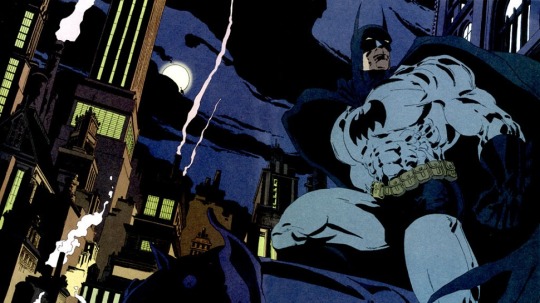
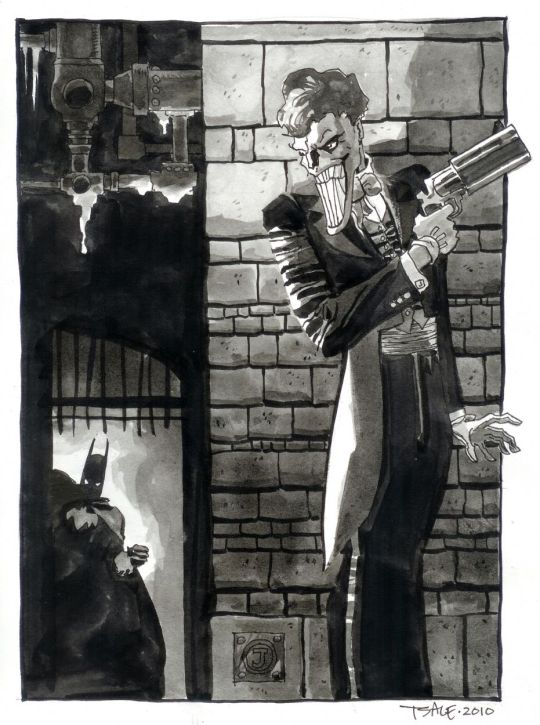


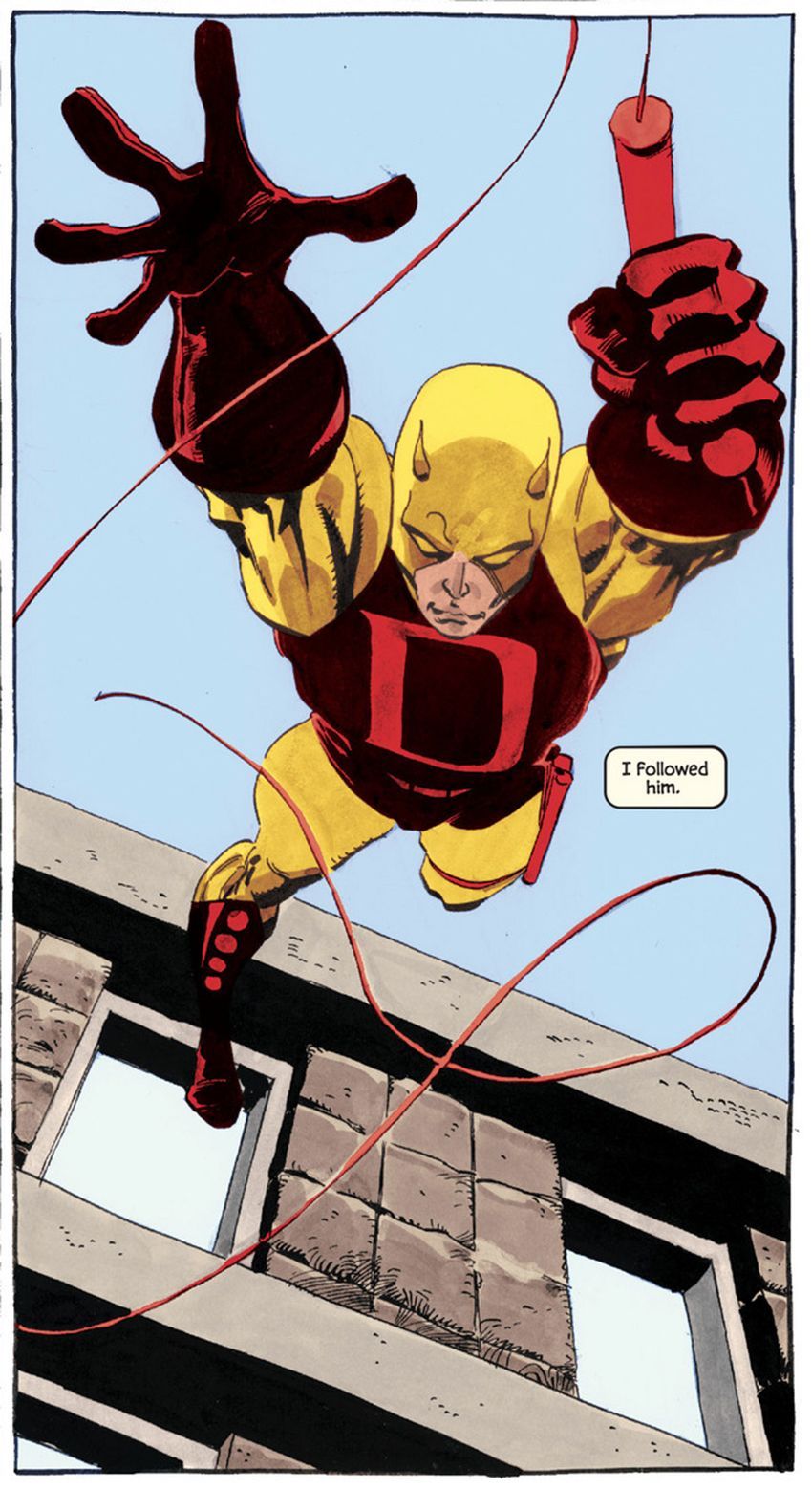
Pedro Franz
Is a Brazilian comic book artist, who was born in Santa Catarina and has a degree in design.
He has been publishing several comic books and participating in exhibitions in Brazil and abroad. As an illustrator, he has published works several magazines and books, and regularly collaborates with the Piauí magazine. As a graphic designer, he is a contributor to the Par (Ent) Esis platform. He has comics translated and published in English and Spanish, and has good international recognition, thanks to his publications.
But what is most impressive in Pedro's art, perhaps is his intensive use of colors. Mixing various shades of different colors, mixing different compositions. In addition to sometimes using characters from pop culture, with his elaborate style.
Despite liking traditional comics, he has always published and worked for national publishers, often with authorial works.
Perhaps his best known work, which was even published in the United States is the comic “Suburbia”.
Suburbia tells the story of Conceição, a girls daughter of enslaved rural workers, who flees to Rio de Janeiro in the early 1990s. In the city, Conceição begins to work as a cleaner and to get involved in the world of funk, slums and poverty.
His drawings are extremely surreal, not exactly following a traditional way of making comics, with several images spread across the page, with different shapes and sizes, with extremely strong colors, mainly valuing blue, purple, yellow and red, as his main colors.
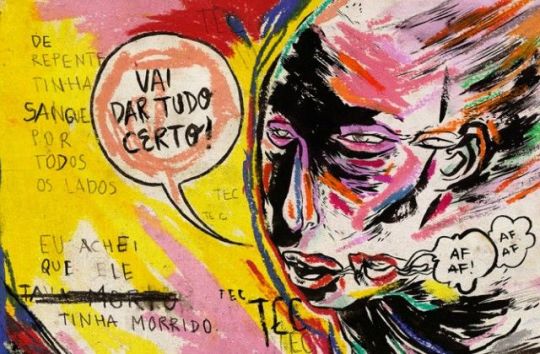
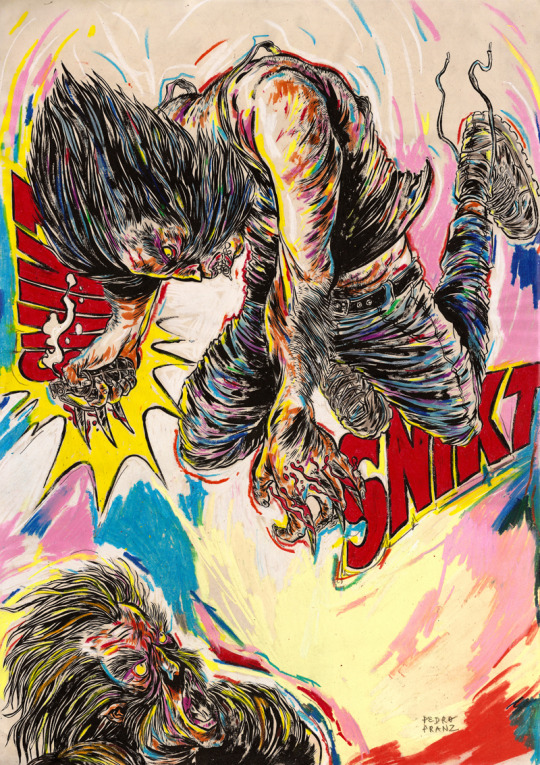
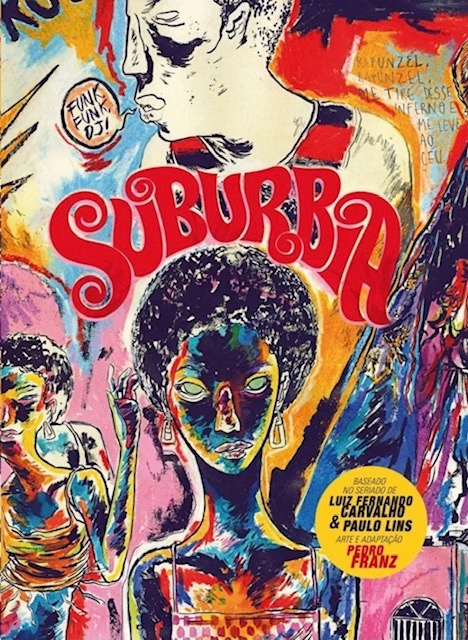
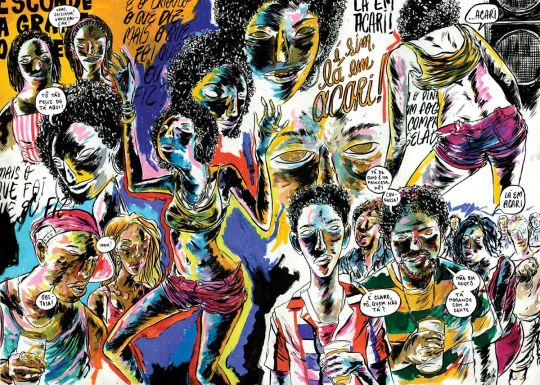
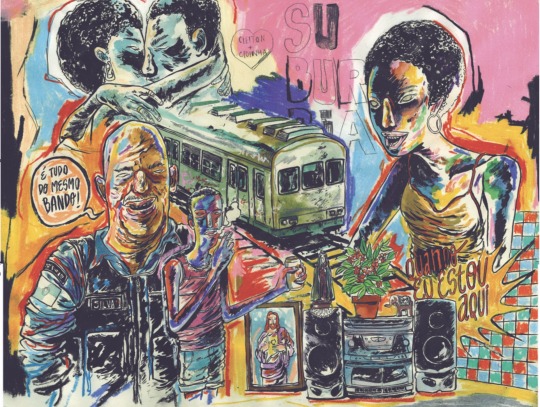
Richard Corben
Richard Corben was one of the contributors of elevating the comics to the category of Art, and of its unparalleled style of great influence among many current artists.
Richard Vance Corben was born in Missouri, United States on October 1940, in a family of farmers in the middle west ( where he started reading comics), and lived in Kansas City. There he studied Fine Arts, got married, had a girl and started working in local cinematography animation company. At the same time, he started to create and publish some underground fanzines. From the begging it was clear that he was interested in science fiction, eroticism, and total rejection of institutions ( the Army, the Church, etc), mixed with a lot of humor.
At a young age, Corben was an aficionado of bodybuilding, just like everyone who was interested in a persons aesthetics. The first character that he created, was Rowlf, a dog who took on a human form. In the beginning of the 1970s he amplified his work ( and his fame) in some underground magazines. And in 1971 he started working for the Heavy Metal publisher where he created one of his most famous characters, Den a large muscular man, who was always naked, and always after some adventure.
Corben has a very particular style, with unsettling mixture of caricatured, often satirical grotesque and intense,convincing realism. Never before had such wildly cartoonish worlds proved so convincing.
Also he can handle an exponentially higher standard because of his ability to use colour to show the effect of light on whatever he’s depicting. The way that he mixes light and colors in certain panels to differentiate those elements from each other, is something to admire.
Corben worked in a few mainstream comics, he always preferred to work with authorial works or working in specific themes like fantasy and science fiction comics and not so much on superheroes.
But probably the most famous mainstream comic that ever worked was the character Hellboy, along with writer Mike Mignola.
Hellboy is a series of comics that has a lot of mysticism, Norse mythology, horror and monsters. Something Corben certainly agreed to do, without thinking twice.
Richard Corben is one of my favorite artists, with a style that is perhaps not as realistic as an Alex Ross for example, but the humor and beauty that he puts in his characters is very unique.
Corben died on December 2, 2020, leaving a great legacy, for the world of comics and arts, with a very unique style and extremely stunning worlds.
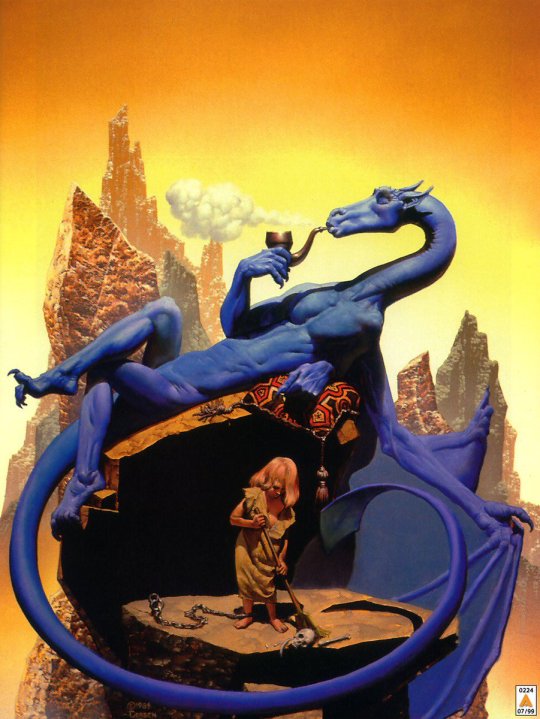
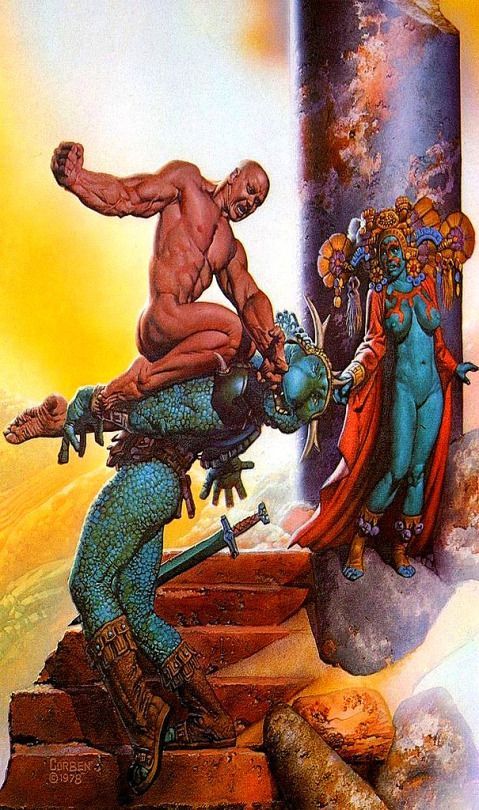
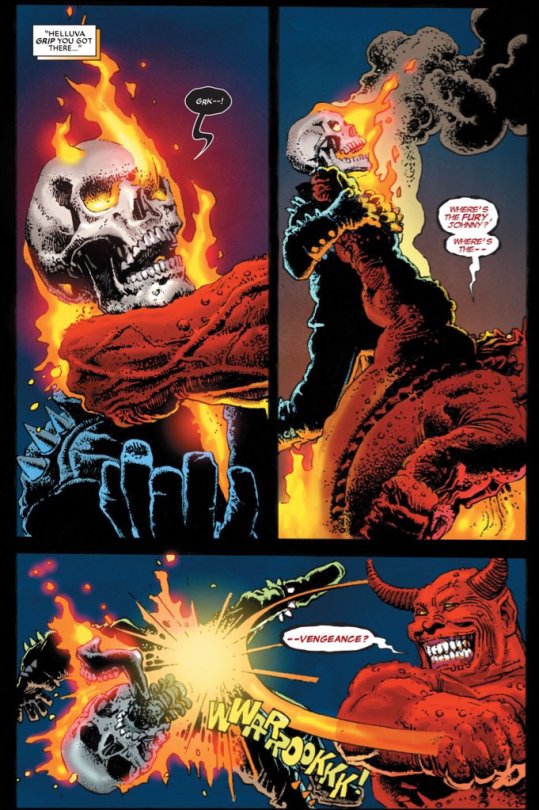
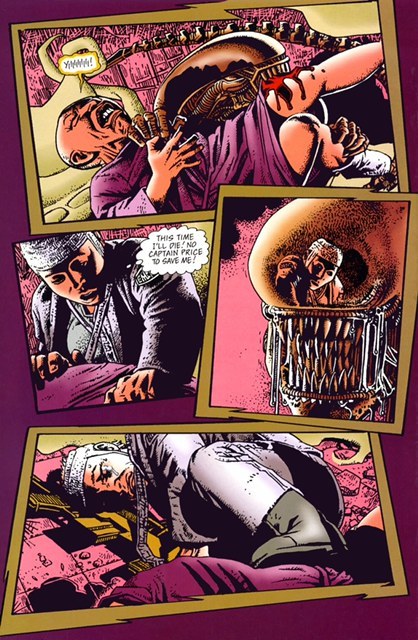
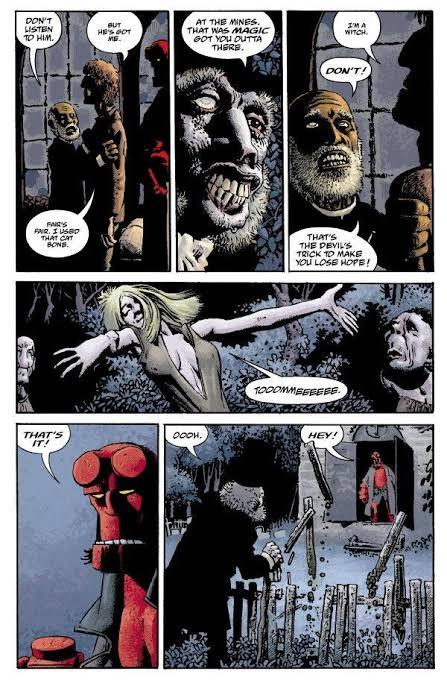
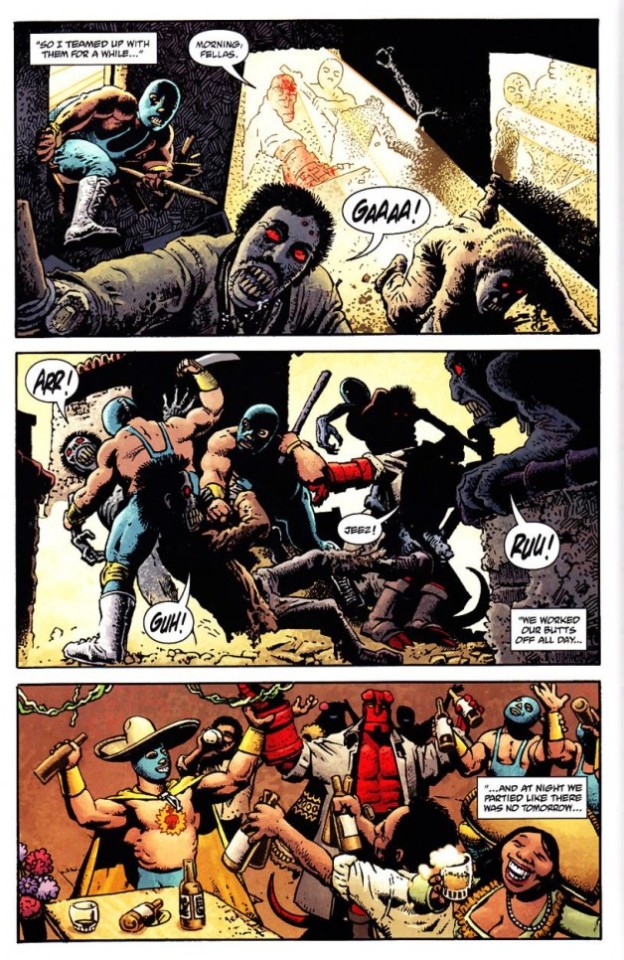
Charlie Allard
Charlie Adlard is a British comic book artist, who have worked on the comic industry for over 25 years. He spent the majority of his time since 2003 working in The Walking Dead along side with writer Robert Kirkman , until the last issue on 2019 He started reading comics when he was very young, and he said that he was very lucky to have influences of American comics and the more high art, such as Asterix and Tin Tin. He was fascinated by European comic books artists like Moebius, Alberto Uderzo and Herge. He started his career as many British artists and writers, working on 2000 AD, with characters such as Judge Dredd, Armitage and eventually Savage. In the United States he started working with the X Files, Astronauts in trouble, and of course The Walking Dead. Adlard started in The Walking Dead from issue 7, and brought a slightly different style, from the previous artist. Adlard's art is very cartoonish, but the universe of The Walking Dead still doesn't get silly because of it. Quite the opposite, the dirt and rot that Adlerd puts on his characters and the world, only sustains what a horrible world it is to live in. Many readers complain about Adlard's style, being very simple, that his characters are very similar, and sometimes it is difficult to identify them. But I believe that although his style does not vary much, when it comes time to show a horde of zombies, a devastated city, people feeling despair, and extremely disturbing scenes, Adlard manages to excel. Adlard's main tool is ink. All The Walking Dead magazines are in black and white, and he manages to give a lot of depth to the scenarios and characters using only a few ink stains. Today Adlard is doing some comics, mainly for DC, but says that he does not intend to work with Kirkman and zombies again, because he wants to explore other themes, and to innovate his drawing skills.
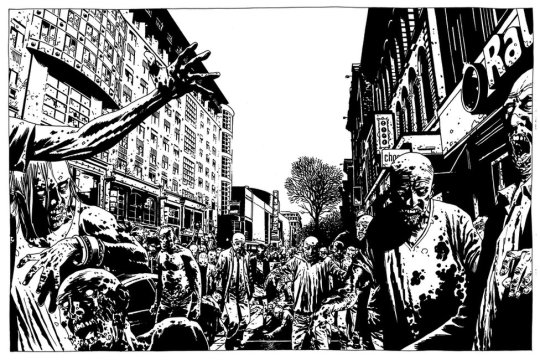
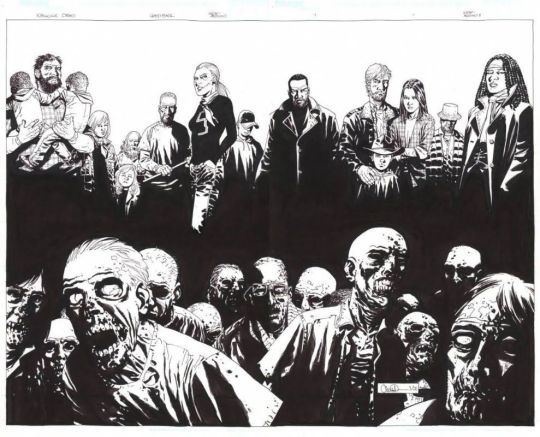
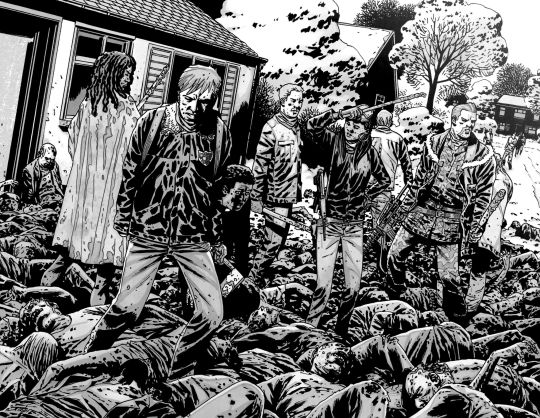
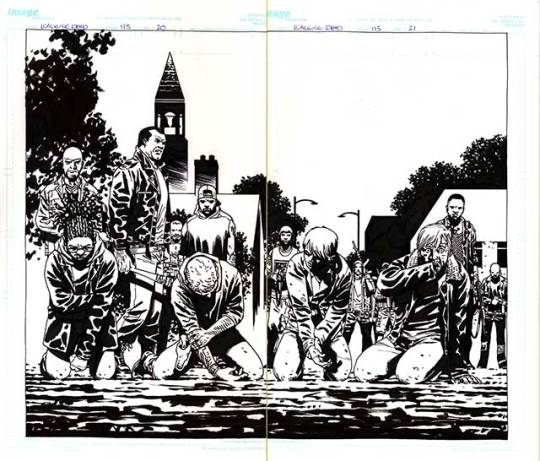
Zaha Hadid
Zaha Hadid was one of the most important and well known figures in contemporary architecture and design. With a singular trajectory, marked by a versatile, bold and out of the box style, she was the first woman to receive Pritzker Prize for architecture and was also the only female representative honored by the Royal Institute of British Architects with a golden medal. Zaha Hadid was born in Iraq, more precisely in the city of Halloween, in Bagdá, in the year 1950. Her family was of high class, her father being an important politician and her mother an artist. Still young, she traveled and studied in other places of the world, like London and Switzerland, but it was in her native land the she got her first formation, when she graduated in mathematics. At the age of 22, in 1972, she enrolled in one of the most famous independent schools of architecture in London, and there she gave the starting point to her career by studying and creating an important connection with the Dutch architect Rem Koolhaas, a figure that encouraged her and opened the doors for opportunities. Later in the 1980s, Zaha Hadid decided to open her own office. This, Zaha Hadid Architects was born, which made her name and talent recognized worldwide. Known for her works with futuristic lines, clean and pure forms, as well as the fragmentation of architectural design. Her projects and discussions raise issues that put architecture and its future to the test. This is because the architect seeks in her works to interrelate design, architecture and urbanism. I knew Hadid and some of her works, but it was the recommendation of my teacher Lauren, that I should look for this architect. As my project takes place in the future, she recommended that I look at some works by Zaha Hadid to get inspiration when creating the scenario for the comic. I find it very interesting how her works have this futuristic aesthetic , because it reminds me of science fiction films like Blade Runner with those skyscrapers and buildings with different shapes and sizes that are extremely imaginative that could only exist in films. With unique works and projects, famous for their exuberance, futuristic elements, curves, non linear shapes, distortions and fragmentations, Hadid inspired and generated fascination both for her constructions around the world.




Syd Mead
Syd Mead was a designer, best known for working on films such as Aliens, Blade Runner, Tron and Star trek. Mead was born in Minnesota, United States, on July of 1933, but five years later he moved to a second house in the western of United States prior to graduating from High School in Colorado in 1951. Some years later, he did the Art Center School in Los Angeles, where he graduated with great distinction in 1959. He was immediately recruited by the Ford Motor Company. At Ford he worked in the advanced styling department, creating futuristic concept car designs. But his imagination went beyond cars and he began to imagine clothes, helmets, buildings and scenery from hyper advanced civilization. After Ford, he also worked in other big companies like Chrysler, Sony and Phillips. After that he started migrating to the concept art world of movies. Mead is really important for generation of writers of science fiction, because many of them were influenced by Mead’s colorful paintings. Mead never wrote a novel or short story. He imagined the future in his mind and turned that imagination into illustrations. In 1979 he designed the extraterrestrial spaceship for the first film “Star Trek” in the cinema. Ridley Scott called Mead to design the buildings and flying cars of the futuristic Los Angeles “Blade Runner” in 1982. In 1986 he was hired to design the space station and vehicles of the movie Aliens directed by James Cameron. Almost at the same time, the designer created the electronic world of “Tron” for Disney studios. The same ones who hired him in 2014 to design the futuristic city of “Tomorrowland”. Mead died in 2019 after three years of lymphoma, he was 86 years old. He was a great influence for many designers and science fiction writers and illustrators, due for his creative worlds and automobiles , Elon Musk quotes Mead as one of his major influences, on visions of the automotive future and design in general.
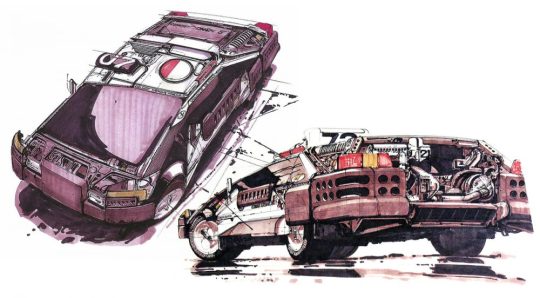
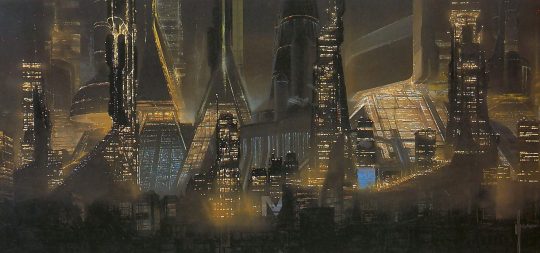
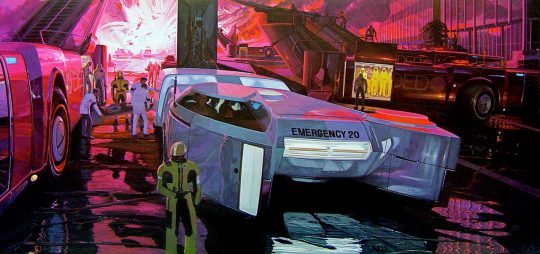

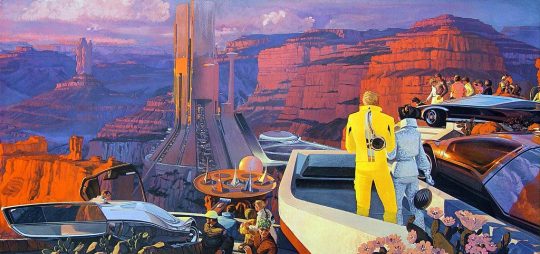
Transmetropolitan by Warren Ellis and Darick Robertson
Transmetropolitan is a comic written by the British writer Warren Ellis and the American illustrator Darick Robertson, published by the Vertigo label, and falls within the cyberpunk genre, and the problems that rampant technology will cause us.
Throughout the 60 issues of Transmetropolitan, Ellis and Robertson build a chaotic and brilliantly alive future, presenting a sci-fi society with a peculiar mix of elements of cyberpunk, political dystopias, bioengineering and transhumanism, sexuality, economics and much more.
In a dystopia, in a not so distant future, the journalist Spider Jerusalem is isolated for fiver years in a hut in the forest, but he has to return to the city to earn some money.
Throughout the comic, amid a nihilistic aura that humanity has no salvation, the author- Warren Ellis - criticizes the consumerism and futility. The illustrations, of Darick Robertson, is full of excesses as the environment should be, a brand of the style of the 1990s.
The search for the truth is the central theme of this work, and in the midst of all this we found ourselves in a investigative odyssey that involves the lowest scum of that society ( thieves, murderers and rapists) until reaches the highest of the scum ( the presidency).
This background allows the work to touch on the most profound social themes, and without fear of saying what needs to be criticized, this is where Transmetropolitan shines, and provoke deep reflections on issues such as racism, the influence of media, the power of religions, the education, and many other themes.
In short, Transmetropolitan dissects and criticizes everything, it points out the flaws, the lies and the hypocrisy of each one. It’s a study about the problems of democratic society in the 21th century.
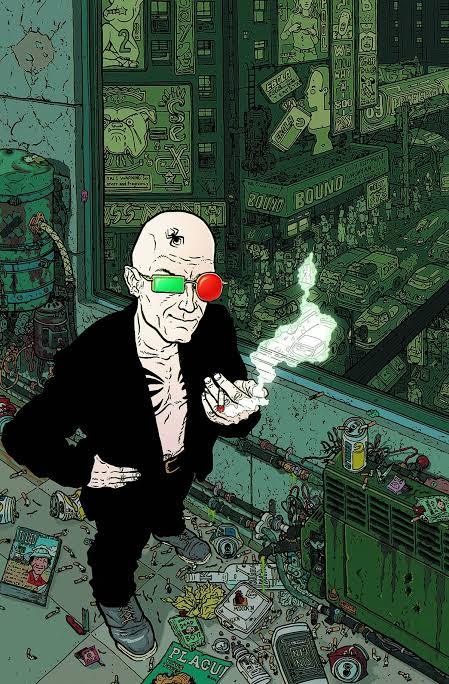
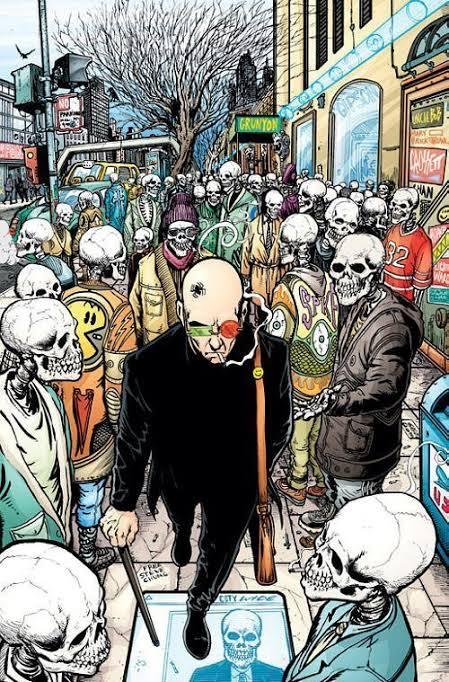
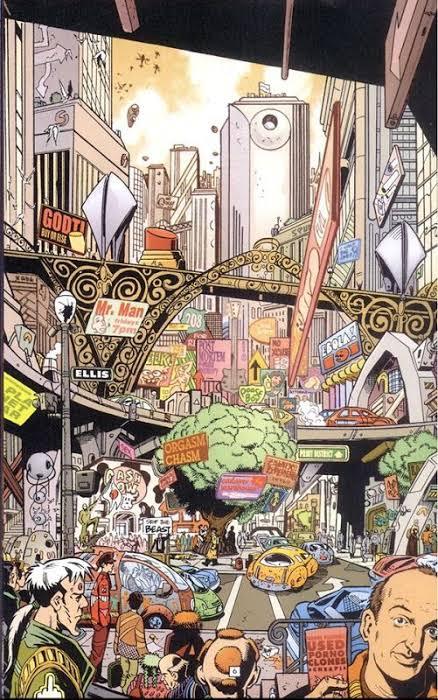
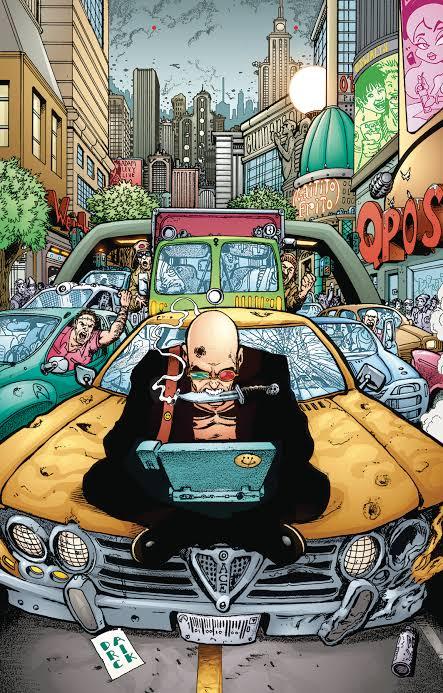
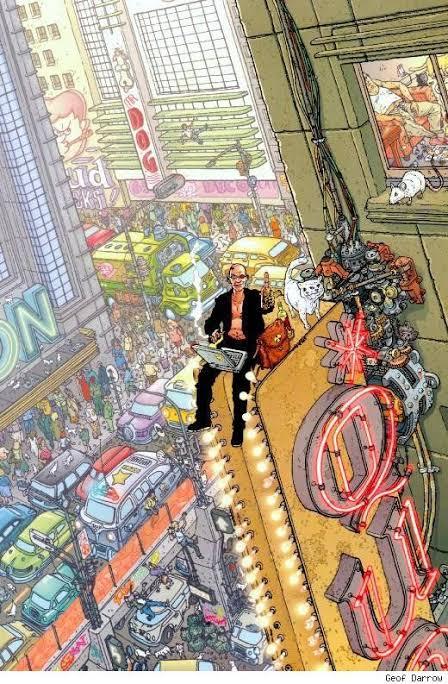
Jon Mcnaught
Jon Mcnaught was born in 1985, London, England. He work with drawing comics, and work as an illustrator, printmaker and lecturer. After spending several years on the Falkland Islands during his childhood, which will inspire his second book, Pebble island. The book pass years after the war, where he tries to recreate his childhood, with aspects of his curiosity, when he was exploring abandon bunkers, where it was just part of landscape, or somewhere where he could play. His work has essentially been landscape print-making (often situated in the city), but with quite simple intention of capturing the sense of space, light, time etc. His work is mostly about that, places that he was interested in depicting, and trying to reproduce the visual. He want the characters to feel like elements of a landscape or an environment ( he preferes to focus more on the background, than the characters itself). But usually he uses figures and postures to suggest expressions rather than close ups showing facial features. What I like about Mcnaught's work is that they are simple designs, but the colors are very vivid. The way he constructs the scenarios is very invective, because it doesn’t need to be extremely detailed, he just needs a few lines to show what he is talking about.
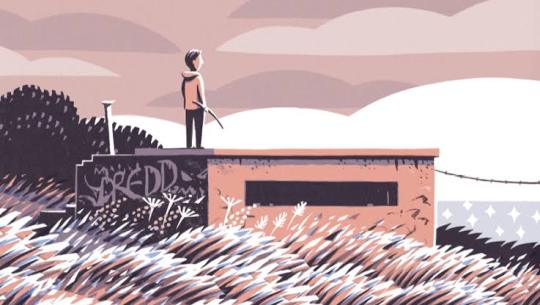

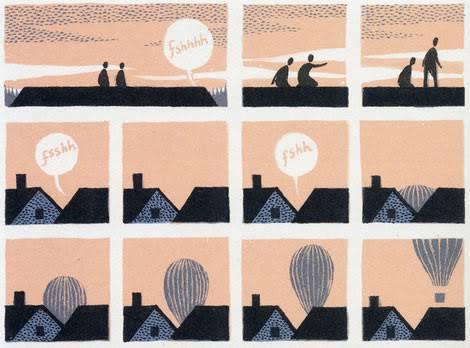
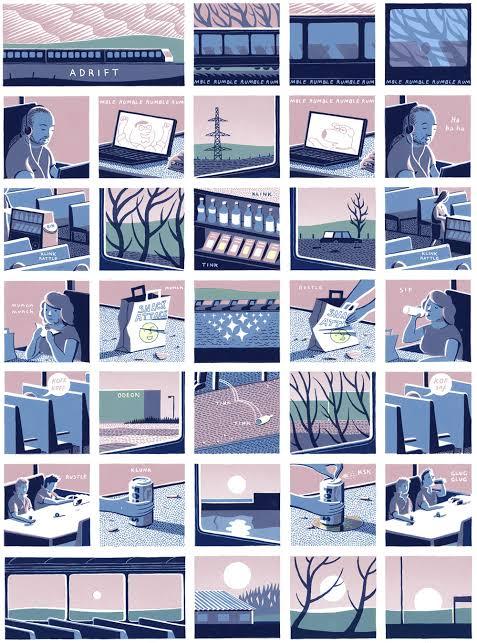
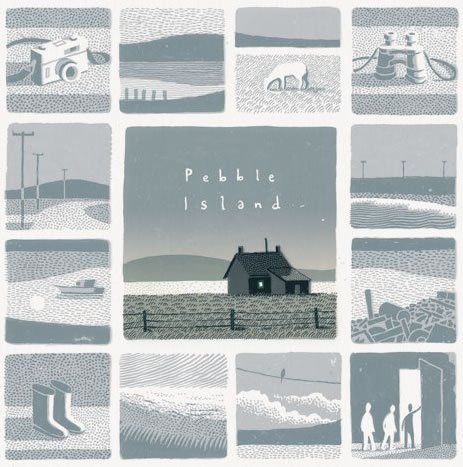
13 notes
·
View notes
Video
youtube
Crown Prince Hussein in an interview with Jordan Television in March 2021, on the anniversary of the Arabisation of army leadership.
The Crown Prince also touched on a number of topics like the state centennial, Jordan’s foreign policies, the repercussions of the COVID-19 crisis and social media.
The video is subtitled & following is the English transcript of the interview:
Jordan Television: In this conversation with His Royal Highness Crown Prince Al Hussein Bin Abdullah II, we will discuss a number of occasions — the anniversary of the Arabisation of army leadership, the centennial of the state, and a number of other topics.
Welcome, Your Royal Highness.
Crown Prince Hussein: Thank you for having me. Allow me first to send my greetings to all Jordan Television viewers and to pay tribute to all those working to counter the COVID-19 pandemic. May the souls of those who passed away from our families rest in peace, and may God protect everyone. “God is best at guarding, and He is the Most Merciful of merciful ones.”
Jordan Television: Your Royal Highness, our meeting coincides with a dear occasion to us all, the anniversary of the Arabisation of army leadership. The Armed Forces, as we all know, have a major and prominent role in safeguarding our nation. And as Crown Prince, Sir, you have a special relationship with the Armed Forces. Can we talk more about it?
Crown Prince: First, Sir, in the army, I’m not a Crown Prince, I’m a First Lieutenant like any other army officer. The Armed Forces teach us commitment, sacrifice and discipline. Frankly, the camaraderie I have experienced in the army is something I have not seen anywhere else.
And as you mentioned, we are celebrating a historic day in the state’s journey. It is an achievement by my grandfather, Al Hussein, may his soul rest in peace, from whom we have inherited the love of and dedication to the army.
And as you know, my father, His Majesty King Abdullah II, is a military man first and foremost, and he has served for a long time in the Arab Army, rising through the ranks to become Special Operations Commander with the rank of Major General.
And to this day, when I accompany His Majesty, I see how he reacts when he meets with those who have served with him, and I feel how happy he is to reminisce about his time with them.
Jordan Television: Honestly, Your Royal Highness, this is a wonderful legacy, and the relationship between the Hashemite family and the Armed Forces is distinctive throughout history. Just recently, we witnessed the launch of the “Brothers in Arms” programme. If anything, this indicates the deep faith in the Armed Forces, including active and retired personnel, doesn’t it, Your Royal Highness?
Crown Prince: I cannot begin to describe how happy I was when this project was launched, because it touches the lives of our brothers who have served in the Armed Forces.
This programme is a priority for His Majesty, who knows how much [veterans and retired servicemen] have given to this nation, out of his close relationship with them. I hope this programme would meet the aspirations of retired servicemen.
Jordan Television: Your Royal Highness, at the start of this conversation, you mentioned the late King Al Hussein, may his soul rest in peace. You carry his name, and many see a resemblance between you and him. Can we speak further about this?
Crown Prince: It is an honour for me, but the issue is not about physical resemblance, what is more important is to carry forward his principles. My grandfather Al Hussein had a unique personality, and from him we learned to have our own independent approach and way of thinking, within the steadfast principles we grew up believing in. May his soul rest in peace, he was an inspiring leader and close to the people, and since I carry his name, this gives me a sense of responsibility and a deep connection to him.
To this day, when I see my pictures with him, I remember my childhood and the attention he used to give me, and it touches me deeply.
When people remember my grandfather Al Hussein, they remember his speeches and positions, but when I see how Jordan continues to stand tall against all odds, I say that this is the legacy that my grandfather left behind, may his soul rest in peace.
Jordan Television: This is a great legacy, Your Royal Highness. We also always see you by His Majesty King Abdullah II’s side. This closeness must have an impact on your daily experience, doesn’t it?
Crown Prince: These meetings are schools unto themselves, and I am very lucky to be able to learn from him. I always see how His Majesty is firm in tough situations and compassionate in humanitarian situations. He always keeps calm and takes the necessary decisions at the right time.
There is no doubt that the responsibilities on His Majesty’s shoulders are indescribable. Those who have simple commitments may not be able to sleep at night, so imagine what it would be like for someone responsible for an entire country. May God bless him and enable us to meet his expectations and serve the nation as he taught us to.
Jordan Television: Your Royal Highness, let us turn to the COVID-19 crisis and its implications. It has been a year since this pandemic started, which has changed much in the world. Your Royal Highness, do you think we will witness any breakthroughs?
Crown Prince: Of course, Sir, this is a new issue for the whole world, and no one knew what sort of enemy we are facing. Unfortunately, many families have lost loved ones, and the lockdowns and infections have impacted livelihoods and the economy. However, God willing, with the vaccine now available, we will be able to gradually recover from the impact of the crisis.
Jordan Television: Your Royal Highness, God willing, and with the determination of all, we will be able to recover soon.
Crown Prince: Jordan was among the first countries to acquire the vaccine in the region, but the delay in the vaccinations is due to delays from the manufacturing companies. Jordan is working to secure a large supply of vaccines, God willing. It is imperative that everyone take the precautions and register to receive the vaccine. Patience is needed, and “with hardship comes ease”.
Jordan Television: Sir, we must also speak about the economic situation. My question, Your Royal Highness, is how can we bolster our economy in light of the challenges facing us?
Crown Prince: Our core challenge is the economy. Jordan has gone through a series of crises, from the Iraq war, to the cut in gas supplies, to the Syrian crisis, and now the COVID-19 crisis. All these crises have impacted economic reform.
Like other countries, there have been mistakes that we must review and learn from, and there must be a clear goal and institutionalised work, as well as bold decision-making in the state’s approach to various economic issues. Policies must not change with the faces, and this must not delay projects.
Most importantly, we must see the results on the ground, and the only concern for any official must be citizens’ interest. Frankly, we do not have time nor patience for any other concerns.
Jordan Television: So, Your Royal Highness, this is a strong call for hard work. The Jordanian society is usually described as a youthful society. Sir, we always see you around youth. How can we enhance young Jordanians’ opportunities and qualifications to join the labour market?
Crown Prince: Our youths are up to the task, and I always meet with them. They all have the energy, but they need the opportunity, so we must focus on honing their skills.
For example, the Crown Prince Foundation is one of the institutions seeking to reach young people in all areas and to contribute to technical education, through several initiatives, such as Al Hussein Technical University. These skills will contribute to qualifying young people to join the labour market.
Jordan Television: Of course, Your Royal Highness, especially since the future lies in technical education, and many local studies indicate there are certain specialties that have become saturated. Your Royal Highness, since we are talking about young people, do you follow their comments on social media?
Crown Prince: Sometimes, when I get the chance. Social media platforms are very important, and it is difficult to disregard them, but they do not always reflect reality. This is why I always try to reach out to people directly.
And sometimes, unfortunately, social media platforms spread negative and false news, so we must always verify the news. Sometimes, I check social media on my phone and suddenly find myself “engaged” or “married”, and there are many false stories that we come across. This happens to most people.
Jordan Television: Sir, Your Royal Highness, you studied international history, and you are aware of the domestic and international scenes; how has Jordan been able to safeguard its interests while maintaining its steadfast positions?
Crown Prince: Everyone knows that Jordan, historically, has gone through much more difficult times than the ones we are living through today. Jordan’s resilience is a lesson to be taught, and this year, we celebrate the centennial of the state, a state that has stood firm and prospered in a turbulent region. This is all due to the strong faith of our people and leadership in this nation.
Jordan’s vision is clear — safeguarding its strategic interests, while our positions remain steadfast towards Arab causes, especially the Palestinian cause, our central cause.
And Sir, Jerusalem is a personal cause for the Hashemites, and a red line for every Jordanian.
Jordan Television: Absolutely, Sir, Jerusalem and its holy sites are in all our hearts. To conclude, Sir, what are your aspirations for Jordan’s future?
Crown Prince: If you want to answer this question, I think it is necessary for us as Jordanians to ask ourselves what is the future that we want? What is the role of each official and citizen in building a community rooted in productivity, justice and efficiency?
Jordan Television: Absolutely, Your Royal Highness, this could be a message to all — we must work towards such a future?
Crown Prince: Our country’s human resources are full of potential; it is a museum from north to south, and we have immense innovative energy.
We have all the key ingredients for progress; we need only to roll up our sleeves and work together as one, because teamwork is key.
And this is who we are as Jordanians. We are all one, God willing, and we are unwavering in the face of all circumstances. I view the future with a sense of optimism, and I pray that God protect everyone and safeguard this nation.
Thank you, Sir, and God bless your efforts
Jordan Television: Amen. Thank you, Your Royal Highness.
15 notes
·
View notes
Text
spn’s mindscapes, ranked
9. toni and sam in 12.02. this is ranked DEAD LAST for what i hope are very obvious reasons
8. EMPTY FUCKING SPACE because that is how much i hate 12.02
7. dean and pamela running a bar while hunting on the side in 14.10. look, pamela is of course awesome and there’s something to be said for dean’s happy place being this bar, continuing to hunt with sam and castiel, and defending it from stuffy corporate-types with absolutely no mention of the bunker, but aesthetics-wise it’s pretty boring.
we get it YOU LIKE BEER AND GUNS and also your brother and an angel and a ridiculous car and a weird fantasy about being the little guy that others are trying to run over except you live in an underground mansion and are the legacy of an exclusive, nepotistic and deeply elitist institution
6. gadreel sticking sam in an elaborate fantasy about being on a hunt with dean that involves... cheerleaders? while using his body to kill kevin and reconnect with his ex in 9.10. this only ranks higher than the last example because it tickles me to think of gadreel carefully calibrating a mindscape with enough Winchester Cliches that sam is convinced but not suspicious but also horrifies me because fuck, non-con possession, kevin dies, and sam will undergo further mutilation both inside and out before gadreel leaves him.
what’s spn unless you’re feeling horribly conflicted due to some Very Unfortunate Implications arising from a non-cursory reading of what’s going on, eh? a far funnier show, i would imagine.
5. dean smith and sam wesson in 4.17. now. zachariah claimed that he wiped samndean’s memories and planted them at sandover to help dean realise the futility of fighting his destiny, but why expend all that energy (and on sam, no less, the man that the angels at this point think is some kind of abomination) when he can just... create this suggestion in dean’s head and let dean’s memories, judgments and presuppositions do the rest of the work?
dean’s sick of sam acting like he’s superior to him so in this mindscape he’s not only better educated, with bobby and ellen as his parents, but he’s also sam’s boss. it’s sam that’s morbid and can’t let go of the supernatural. there’s an explicit and cruel reference to the fact that one of sam’s ex-girlfriends was a werewolf (”i tried madison’s number and it connected to a veterinary hospital”) when just a few episodes ago dean had basically called sam a monsterfucker. in the end, for the moral of the story bit, sam is conspicuously absent.
ssssh it makes sense LET ME HAVE THIS
4. sam wandering ever closer to his death in 9.01. man, i love the way sam’s mind works. he sets up a bobby construct and a dean construct to explain to him what’s going on, and give him both absolution and resistance respectively. (it’s so painful that dean-in-sam’s-mind would make his point by punching the shit out of sam, but that’s very in-character for dean).
sam crafting his own path towards acceptance of his death, acknowledging that he did good and important things when he was alive, and looking forward to the peace ahead... just beautiful. i’m not going to get into the debate over dean essentially tricking sam into being possessed by an angel to save his life (and continuing to gaslight and lie to him, well beyond the point where sam is not physically dependent on that angel anymore) except to comment that sam’s palpable heartbreak and indecision at there ain’t no me if there ain’t no you will haunt me forever more
3. the little djinn-made fantasy lands in both 2.20 and 8.20. i just love djinn-verse’s sam having no real emotional connection to dean yet still choosing to stick with him to help him out of what looks like trouble. and dean’s happy lawn-mowing! i want more stories from this verse.
2. the endverse from 5.04, for similar reasons to 4.17. i think zachariah did have a lot more influence on how this mindscape played out, but there are so many details informed by 2009!dean’s thoughts, beliefs and perception of his cultural landscape: including having sarah palin as president (an idea far more culturally relevant in 2009 than 2014), a fallen castiel’s humanness meaning he is sexually promiscuous/adventurous (dean had taken castiel to a brothel just the previous episode to give him a taste of humanity) and the alienness of lucifer in his crisp white suit, something we see lucifer never appear in again until in another one of dean’s visions in s15. lucifer’s monologue might be zachariah’s doing but his appearance as this malevolent, tightly wound creature wearing an expensive suit and holding a rose even while surrounded by literal and human wreckage arises from a knot in dean’s mind that has all of dean’s fears for and resentment of his brother.
besides, the end’verse is just cool.
1. sam’s split mindscape in 6.22. there’s so much internal logic to how sam organises his psyche, a neatness to the constructs that his subconscious sets up to explain things to his conscious mind. soulless sam reveals a relentless and pragmatic side to him, but could he have successfully assimilated hell!sam without soulless!sam’s survival instinct? his internal architecture has been ripped apart, hastily repaired, then crumbled all over again; watching sam meticulously put himself together just in time to go and try save his brother is fascinating.
sam’s mindscapes tend to be far less rich in detail than dean’s, but they are ones he puts together to make sense of his fractured self while dean’s unravel at the suggestion and influence of outside entities.
26 notes
·
View notes
Text
“I Am YEG Arts” Series: AJA Louden, Co-Lead Artist for Paint the Rails

Set achievable goals. When most people hear this, they likely think about getting their steps in or cooking more meals at home. Not AJA Louden. His goal? Making cities more inspiring, informed, and thoughtful through the compassionate use of art and design. And he’s achieving it. Louden’s spray-painted portraits and murals have been boldly transforming our city’s everyday walls into landmarks for more than a decade.
When Louden’s not painting, he’s likely teaching others how to at his Aerosol Academy, a workshop that explores art-making and art history through the lens of graffiti and street art. But that’s just the beginning. Louden’s desire to bring a collaborative, multi-narrative approach to contemporary urban muralism can also be seen at LRT stations around Edmonton, thanks to a project called Paint the Rails (PTR), a collaboration with Edmonton Transit Service and the John Humphrey Centre for Peace and Human Rights.
Paint the Rails: Conversations on colonization, reclamation, and reconciliation through art, is not only a legacy project of Canada 150+, but also a tangible commitment to bring to life the stories of Edmonton’s cultural communities through art and education. The plan of action? Paint LRT stations across Edmonton with imagery that interprets the stories and traditions of the Elders, historians, knowledge keepers, and cultural communities represented by each location. Ambitious? Yes! But neither AJA Louden nor the John Humphrey Centre has ever considered “hard” a reason for not doing something. Lifting up our shared stories, amplifying voices, and changing perceptions—this week’s “I Am Yeg Arts” story belongs to AJA Louden.
Tell us about your connection to Edmonton and what keeps you living and working here?
I grew up here in Alberta and moved to Edmonton in the early 2000’s for school. Some of the things that keep me living and working here are my relationships, my work, and the food. Food has always been a big inspiration for me as an artist, and there’s so much good food here! Edmonton has long been a place of creative exchange, and I’m excited to help keep that spirit alive through public art.
How did you become involved with Paint the Rails, and why did it resonate with you?
I’ve been working with the John Humphrey Centre for Peace and Human Rights (JHC) for years. When I think about the power of addressing the human condition through art and stories, I think organizations like the JHC do an invaluable job of helping to identify whose stories are missing from our public discourse and amplifying these voices to give us a more accurate reflection of who we are. The Paint The Rails project resonated with me immediately because it was an opportunity to use public art to lift up our shared stories and bring them into the present. The methods of mentorship and community consultation we worked with throughout the project changed how I work as an artist and helped me understand how to connect with people at a deeper level. I began researching Augmented Reality (AR) part way through the
Paint The Rails project and self-funded the AR programming and animations until we were able to obtain a grant—I did this because I believe in the value of this project for adding beauty and meaning to our shared spaces. Each location is now a digital community history resource, as well as a wall mural!
What do you think it is about story that brings us together?
We use stories to help understand ourselves and our communities. People often define themselves through a series of stories that explain who they are and how they came to be that way. Communities use stories in the same way. Stories can be guides for how to interact—our cultures are built up of shared stories, which act as scaffolds for meaning. When we share stories widely, we can start to understand the world from other points of view, which can bring us together and give us a sense of cohesion and group membership that’s valuable. A big part of the human experience is a search for meaning and purpose in our lives, and stories can be powerful tools on this journey.
How do large-scale murals and street art play to your strengths as a storyteller?
Stories have power when they are shared, and the scale and accessibility of large-scale art in public spaces allows a larger audience to engage with a story. When work is in a gallery behind a paywall, audiences have the benefit of a dedicated space in which to absorb or reflect on the art, but these spaces often leave out those who can’t afford or don’t feel welcome in that kind of environment. Street art and murals have the potential to reach people who don’t as often engage or connect with art in galleries or institutions. Growing up, I didn’t see myself reflected in the art classes I took in school, but when I found graffiti and street art, I started to see the world in a new way.
Why was mentorship a key element in Paint the Rails, and what do you hope you’ve shared?
Mentorship is key because I see artists as an important part of a functioning society. By sharing what I’ve learned with the next generation, I can help our craft stay relevant, cohesive, and present. We all stand on the shoulders of those who came before us, and a rising tide lifts all ships. As artists we need to hold each other accountable, and part of that includes building each other up and celebrating our individual wins as wins for the collective craft.

Tell us about someone who’s been a mentor to you.
Dawn Saunders Dahl has taught me a lot about the industry of art, and when/how to play by the rules, while pushing boundaries that need to be pushed. Working with her I learned about process, particularly how to build a plan that had structure but also flexibility.
Jason Botkin was really helpful to me in getting a closer look at the life of a full-time muralist. I met him when The Works brought En Masse to Edmonton. He was really kind and generous with his time, invited me to come hang out in Montréal for Mural Festival, and also connected me with a lot of people in Miami for the two years I attended Art Basel to paint. Huge thanks to both Dawn and Jason, as well as the other informal mentors I’ve had over the years who have made me better.
Why was a free Paint the Rails app vital to this project?
The app was vital to this project because it allowed us to capture more of what each community shared with us and reflect it back into the world. As the first Augmented Reality community mural project in Edmonton, it’s allowed us to create an additional point of interest for the project and to attract new eyes. As an artist, I’m always interested in trying out new mediums and looking for ways to bring important stories to new eyes. One of my favourite parts of the app relates to language—we worked with Cree linguist Naomi Macllwraith, a student of Dorothy Thunder, to record the Cree names of each of the local animals depicted in our U of A LRT station mural, titled Sipiy (River). When you activate the app at that site, you can hear the correct pronunciation of each of the animal names—something that a wall mural wouldn’t normally be able to share.
What excites you most about the YEG arts scene right now?
Growth and potential. I think Edmonton is joining the world in starting to understand the place that murals, unsanctioned street art, and graffiti can occupy as a valuable part of the public art scene. More institutions and business owners are getting excited about art in our shared spaces, and thanks to the building boom in the 70’s, we have a lot of wall space to use as canvasses so we can share our stories as a city.
What has working with the John Humphrey Centre for Peace and Human Rights taught you about yourself?
Working with the JHC has taught me a lot about process and community connection. I’m as interested in being a conduit for expressing a community’s vision as I am about telling my own stories, and I have a much stronger working knowledge of how to ask for, receive, and honour stories from different groups of people. I look forward to the next stages of our collaboration!
You visit Edmonton 20 years from now. What do you hope has changed? What do you hope has stayed the same?
I hope the locally owned restaurant industry is still strong, creative, evolving, and inspiring. One of my favourite things to do with friends and family who visit is take them for great food. I hope we’re culturally still vibrant, even more connected, and retain a combination of the strong work ethic, creative vision, and resourcefulness that has helped define us so far. I look forward to seeing how we continue to redefine our city as the world changes and how we tell our stories in new ways.
Want more YEG Arts Stories? We’ll be sharing them here all year and on social media using the hashtag #IamYegArts. Follow along! Click here to discover more about AJA Louden, and visit the John Humphrey Centre for Peace and Human Rights website for info about Paint the Rails, their app, and other JHC initiatives.
About AJA Louden
AJA Louden (AJA sounds like 'Ajay,’ short for Adrian Joseph Alexander) is an artist based in amiskwaciwâskahikan (Treaty 6, Edmonton, Alberta). Born to a family tree with roots split between Jamaica and Canada, Louden is a child of contrast. Bold and arresting freehand spray-
painted portraits of pop-culture figures from Jimi Hendrix and Richard Nixon to local heroes like Rollie Miles often alternate with hand-lettered designs and vibrant patterns borne of a background in graffiti. Louden looks to bring a multifaceted, collaborative, and multi-narrative approach to contemporary urban muralism.
A background in the sciences, including biology, chemistry, psychology, and sociology is a major influence on the concepts and processes behind his work. A few years designing custom metal signage and a childhood full of building wooden skateboard ramps intensified AJA’s interest in industrial design and the built environment. His work can be found around the province of Alberta where he lives and works. A travel lover, Louden has also created work in several other countries, including Berlin, Barcelona, Florence, Prague, and the UK.
2 notes
·
View notes
Text
A Punchable Face That I Want to Kiss, Ch. 3
<- Previous Chapter | Chapter 4 ->
Summary: Chilton thinks about you when he knows he’s going to die.
1,849 words
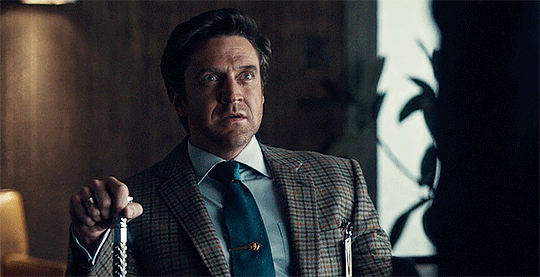
“Do not come over tonight,” he said. Even through the bad cell phone connection, you could tell he was nervous, and it made you nervous.
“What’s the matter?”
“Or tomorrow night,” he continued. “Or ever. Stay away.”
“What?” Your heart sank. “What are you saying? I thought things were going well…”
“Only for the time being. You... may have been right,” his voice cracked ever-so-slightly. You knew it pained him to admit that, and the fact that he did made your blood go cold. “I think Hannibal Lecter is going to kill me. There is no reason for you to be there when it happens.”
Shit.
You worried when he started to believe Will Graham—ironically, the very thing you had wanted to begin with, but Will had changed, and you couldn't help suspect he was trying to get revenge on Chilton by roping him into investigating Hannibal Lecter. You were certain he at least didn’t care if Chilton was killed when Will started dangling fame and glory in front of his nose.
Chilton was too ambitious to resist the promise of fame and glory, and was the kind of fool to go poking his nose where it didn’t belong.
“Fuck that, I’m coming over. If we’re together, I can protect you.”
“Don’t. I am going to try to... Wait,” he paused, marveling, “you would do that for me?” His resolve firmed again, “Do not come. Please. Look, there is nothing connecting us except sex—good sex, mind you, but—you may not be on the Ripper’s radar. If you are close to me when he comes, he will only kill you, too. It’s not worth it. I do not want you caught up in this. Take the advice I should have: do not get involved.”
There was a click, and the call went dead.
You felt gutted.
*****
Frederick was the kind of man who spent all his nights and weekends alone, until you. It was pathetic to think you were his most stable relationship—not just currently, but of his entire life—when he had only known you for a few months.
That was not to say he was inexperienced.
He had fumbled with plenty of bras as a young legacy in a Harvard fraternity, and with fraternity brothers in dark closets, mostly under the influence of cheap alcohol (bought ironically, of course).
He dated in medical school, but there wasn’t much time for relationships when he was constantly studying twice as hard as everyone else just to stay in the middle of the class rankings instead of sinking to the bottom. Besides, in academia there was a full menu of up-and-coming doctors to choose from, and he was never found to be the most appetizing selection. Too bitter.
Family money opened all the right doors for him after graduating and starting his own practice. There, he could sit on top of his own throne without all the competition. Wealth and power finally made him a prime cut to the type who wanted to marry an important doctor, and the nurses and secretaries fell at his feet.
Unfortunately the type of person who, first and foremost, wanted an important doctor, was not interested in an emotional relationship—at least, the money came first.
Some sought the full package of money and romance, but those he always chased away after one or two dates. He found that anyone willing to tolerate his personality defects was the type to borrow his credit cards, ply him for gifts, demand a promotion, ignore him or cheat the moment he wasn’t buying something, and ultimately blackmail him for one final payout when even the money and status weren’t enough to tolerate being with him any longer.
It was fine, he told himself. He used them and they used him—it was how the game was played.
Then there was you.
Frederick Chilton always found you arrogant and unpleasant. He was an expert in his field, a respected psychiatrist who had discovered the Chesapeake Ripper in his facility, and you spoke to him as if he were a child!
(Well, assuming you swore so much at children. He wouldn’t know. children are filthy.)
Whenever he saw you entering his hospital, he knew he would need an extra glass of scotch to recover. You were fierce, never making a single effort to mask your intentions, whether it was tearing into him for (allegedly) unethical practices, or failing completely to mask your sexual attraction to him.
It had been a long time since anybody made a pass at him. Running an institution for the criminally insane was not widely considered sexy, and made his doctor-husband stock plummet—a fact for which he was grateful. Romance was hardly worth the effort, and he would rather be alone than pretend.
He should have shot you down. It would have delightfully changed the power dynamic—any time you insulted his methods, he could remind you of your embarrassing plea for his attention.
But in truth, he enjoyed sparring with you. The days you didn’t come rattle your sword at him were dull. Nobody else spoke to him so brazenly, even though many certainly shared your opinion. It was refreshing.
He’d been imagining ripping your clothes off for weeks.
This would be a one-time thing, he thought: another case of using and being used. He assumed you would call a taxi when it was over, but when he woke up in the morning your arms were wrapped around him with the sweetest smile on your lips. It was odd. It sort of made his chest ache even though he was sure he liked it.
This must have been what pity sex was like. Ah, the advantages of a cane!
Stranger still, you kept coming back to see him. A one-night stand turned into two, turned into three, until it became a habit—and you spent additional time with him for no particular reason he could discern. The sex was great, but fucking did not require staying the entire night to cuddle. When he was too busy working late to stop for dinner, much less for a sexual escapade, you showed up anyway, surprising him with a bag of fast food. It was greasy and barely edible, but thoughtful. You read a book in one of his leather chairs and ate all his fries while he typed reports into the night.
Surely you had other partners to choose from who would have been more entertaining. Your behavior was quite abnormal.
He knew you had an angle, but couldn’t figure out what it was. Breakfast, maybe?
The fact that he made you eggs and gourmet coffee didn’t seem enough to account for your always choosing to spend time with him. You said his house was nice, but even that wasn't enough. The equation was unbalanced. He never paid you, and you never demanded gifts—even when he offered them, you flatly refused. You would not let him so much as replace your cracked cellphone screen. You had always been so vehemently insistent about Will Graham’s innocence, but since you started sleeping with him you’d never asked for any favors, like moving Graham to a nicer cell or falsifying a psych evaluation.
He’d even had a full-blown panic attack in front of you. Something you could have used as leverage to threaten his very career. But you didn’t.
If you were ingratiating yourself with him for an ulterior motive, you were terrible at it.
Honestly, terrible. He wanted to give you pointers, but it would spoil the game. Unless—he considered the terribly disconcerting possibility—there was no game. You weren’t using him, you just had feelings for him. Real ones. It made him feel strange and off balance—if there was nothing transactional about the relationship, it was not something he could control. The thought disturbed him so much he nearly called the whole thing off, but something stopped him from picking up the phone. There was a squirming in his gut, and he didn’t like it.
What did you possibly want from him? What reason did you have to care?
Was it pity?
Pity was the only answer that made sense. Pity made you want to protect him; you had said as much on that first morning. It explained your change from hostility to affection (usually it went the other way around), and why he hadn’t driven you away by now.
It was nice, he thought. He rather liked your pity.
He would have been happy basking in it for a long time, but… he made an error in judgment.
Chilton knew he had fucked up. He was so drawn in by Hannibal Lecter, trying to be his friend—trying to be like him—and all the while whispering sensitive information right into the Chesapeake Ripper’s ear. Then he had to go and listen to Will Graham, to show Jack Crawford that tape with evidence that seemed so solid at the time. But he was played. Hannibal knew he knew, and Chilton was the Judas who tried to sell him out.
He was dead meat. Literally.
He was dead, but you—you had believed Graham from the start, and stayed far away from Dr. Lecter. He was dead, but you didn’t have to go down with him. He could keep you safe. Out of the line of fire. The time you had spent together recently had been nice, and while he had no desire to die alone, the twisting in his gut insisted that he owed you that much for giving him so much of your time. This was the right reason to call things off.
One good deed could not make up for a life of misfortune and selfishness, but if he could save you from sharing his fate, then dying would not be the worst thing that could happen.
*****
“Him? How can you honestly believe Frederick Chilton is capable of being a serial killer?!” you screamed in Jack Crawford’s face after he arrested the shaken psychiatrist. Since learning what had happened, you were… upset. “Are you stupid? He’s being framed, just like Will! That man does not have the constitution to make dioramas out of murdered bodies—he’s an anxious nerd who can’t even drink coffee unless it has been first digested by a civet!”
“Watch it, or I'm sending you home,” Crawford warned as the federal agent who would tolerate no disrespect, especially in the middle of an FBI field office. As Crawford the sensitive father figure, the edges of his hard stare softened with sympathy, and he pat you consolingly on the arm.
“At least let me see him!”
Crawford did his best to calm you down, reassuring you that Chilton would be investigated fairly using all the resources of his task force. So you tried to relax as the doctor was handcuffed and dragged into the bowels of the field office to be interrogated. Crawford guided his old protégé, Miriam Lass, into the observation room to confirm whether Dr. Chilton was in fact the Chesapeake Ripper who had held her hostage for three years, while you paced impatiently outside.
There came a loud bang.
62 notes
·
View notes
Text
Aang, genocide and remembrance.
Aang’s is a genocide survivor. The Air Nomad Genocide was the massacre of a nation. A genocide:
“A coordinated plan of different actions aiming at the destruction of essential foundations of the life of national groups, with the aim of annihilating the groups themselves. The objectives of such a plan would be the disintegration of the political and social institutions, of culture, language, national feelings, religion, and the economic existence of national groups, and the destruction of the personal security, liberty, health, dignity, and even the lives of the individuals belonging to such groups”
Of all definitions of genocide this is my preferred one because it truly encapsulates the extend of violence. The air nomads were murdered relatevily quickly. It wasnt a big campaing as much as we know but then the genocide continued until a 100 years later there is barely remembrance of that people. They were physically and culturally erased from existence.
Genocide survivors often feel they are on a different planet, that they cant share with others and that no one seems to communicate with them, difficulty appropietly mourning their loss ones, guilt over being alive while others are not, guilt over not being able to do something.
I see and wee se all of this in Aang: He is unable to communicate his viewpoints to a world completly indifferent to air nomad philosophy he is constantly mocked and missunderstood over what seems the cornerstone of his culture, he cant properly mourn the death of his people because the world has already moved on and as much as Katara and Sokka try is clear that his grief is his alone and his anger as embarrasing as it is to him is also his alone. Even the way he deals with his emotions are mocked both by the world he lives in and the audience.
He feels so guilty that the place in which his trauma is placed is always coming back to the day he left. He has no memory of the catastrophe so the traumatic event is always placed on that night and he constantly comebacks to that guilt fixated on that choice
But Aang particular trauma -and healing- over the genocide of his people is always so related to the final choice that controversial choice. Its to me the moment of payback and the moment this silent battle of Aang makes sense and finds some resemblance of closure.
Aang doesnt screams at the sky the way Zuko would. He is not prone to rage but when you connect the dots you do realize he has being waging his own silent war and the war finds its end in the sparing of Ozai’s life.
Ozai’s sparing life to me is not about teaching the audience to forgive. Its Aang’s personal resolution to his own suffering. He is able to grief in a way that works for him even if the rest of the world or us dont understand.When everything is lose to someone the need to share with others becomes urgent; to bear witness is vital. The necessity of uphold and give value to that that has being violated to you is desperate.
Aang’s sparing Ozai’s life heals Aang’s. He is also sparing himself and allowing himself to live a life that is livable for a survivor. He solves the conflict that has being eating him alive the whole show. The world has move one, should i move? should i abandon my believes and values because the world is changed? Should i forget in practice my people? Aang’s could have killed Ozai to make the world and the audience happy but he wouldnt have allowed himself a future without grief. He wouldnt have bear witness to his people. He wouldnt remember their existance, loss and legacy.
I understand that you dont like how he solves the conflict and im sorry but this is not about the world, this is the resolution of Aang’s arc. This is him healing himself from trauma, upholding his people past and allowing himself a future that would make HIM proud.
42 notes
·
View notes
Text
“Stark’s New Intern” Chp. 19



youtube
"When I first saw you You had a sparkle in your eye Like the stars at night High in the sky
How I wish That you were mine 'Cause to me You're one of a kind
When I look at you It seems so untrue How someone like you Can make me feel the way you do"
Cameo—"Sparkle"
"Erik, you here with us, man?"
Walter's keen dark eyes took in Erik's solemn face as they sat in a popular and busy diner on Pico and La Brea eating pancakes and thick cuts of Canadian bacon. Maria and his Aunt Shavonne shared nail care tips to prevent chipping as his Uncle Bakari cut up his food and ate with a contented face.
Erik pushed circles in the maple syrup on his plate and checked the thin cell phone near his half-empty cup of coffee. Devika still wouldn't return the ten or so texts he sent her.
"My mind is scattered, sorry."
Devika ignoring him, and Tony being cryptic had him on edge. He deleted messages from Giselle and Athena wanting another Ménage a Trois encore and looked Walter in the face.
"You still trippin' about earlier?" Walter asked.
"Nah. I'm over that. It's just…I was foul with that and I hurt my girl."
"Your girl? Which one?" Walter joked.
"Shut up," Erik said giving his friend a grin.
Walter's braided hair was pulled up into a palm tree bun.
"My dude, you've always been messy. Nothing's changed. You've leveled up though."
"Leveled up? I ain't never been with any questionable…"
He almost said hoes, but his Uncle was listening.
Walter leaned in closer and whispered.
"You did them both at the same time?"
Erik gave a subtle nod.
"Man…"
Walter chuckled and ate more bacon on his plate.
Erik glanced at his cell again.
"Expecting a call?" Bakari asked.
"Nah. Just checking for work messages. Sometimes Stark sends mass alerts. Gotta keep on top of stuff there. Even on the weekends."
"You look good. We're proud that you stuck with it," Bakari said.
"It turned out better than I thought," Erik said.
His stomach got tight and Maria glanced over at him. He caught her eyes sliding over to Walter.
"How's school man? We spent all this time talking about my internship, what's poppin' back home?" Erik asked.
"I quit."
Walter popped his last piece of bacon in his mouth.
"Walter!" Shavonne scolded.
"Why?" Erik asked.
"It's not for me. School was always your forte man, and I know my parents wanted me to be like you, but my talents are in fashion…textiles."
"Are you a designer?" Maria asked.
"Yeah, I am," Walter said holding her gaze, "I dropped out of SFSU and enrolled in the Fashion Institute. Going to start my own brand of sportswear. Merge tech and clothing together."
"Dope," Erik said giving Walter a pound.
"Call my parents and tell them that," Walter said.
"When we were in grade school, this fool designed bullet-proof clothing for elementary kids," Erik said pushing back his plate.
"A lot of shootings were going down, and I wanted to stay safe."
"That's, wow…that's kind of sad," Maria said.
"That's how it be in the East Bay sometimes," Walter said.
"Everywhere," Shavonne chimed in.
"I start in the fall and I have already lined up my own internship with Trekfit. They're new, hungry, and I can parlay my talents into maybe getting my own stuff out in three or four years."
Erik and Walter shared a joke in Korean and Maria watched them both.
"You speak Korean?" Maria asked Erik.
"Passable—"
"Barely," Walter said.
"Good luck with the educational changes," Bakari said. He stared at his watch, "Are we all ready to hang out at the pier?"
Bakari drove them all in a rental car, and Erik found himself sitting in the middle of a conversation between Walter and Maria. They had only been together for two hours but they already acted like an old married couple. Divisive opinions on anime, gaming, and sticky rice flew across his lap since he sat in between them in the back seat.
The weather was almost perfect, a little too hot as the temperature raised above eighty degrees, but Erik enjoyed strolling on the pier and talking with his Aunt and Uncle. Maria and Walter had paired off to ride the carousel and Erik kept checking his phone.
"Just call her," Bakari said.
His Uncle snacked on chocolate and vanilla soft serve ice cream as his Aunt Shavonne tried to shoot fake ducks for prizes with water guns.
"I saw how she looked at you when she stood at the door. I damn near had a flashback to your Pappy back in school. You actually had the same look on your face. What's her name?"
"Devika."
"You sure do like 'em grown," Bakari said winking at Erik.
"Everyone is older than me there, so I don't really have control over that."
"Walter is right too, those were some boss looking babes. The legacy continues."
"It is what it is Unc. But I didn't mean for that to happen. I was supposed to go see her last night and I just…messed up."
"Protecting yourself?"
"Always."
"Respecting them?"
"Yeah."
"But this Devika?"
"I got caught up and forgot to communicate with her. I wasn't expecting her to show up like that. I'm actually not supposed to be seeing her."
"Why not?"
"She's um…she's Stark's secretary."
"Erik…boy, I tell ya…"
Bakari ate his ice cream and Erik watched his Uncle's face.
The man was heavier in the face and body, and he was happy with Shavonne because it shone all over his face when he looked at her. His uncle treated his wife the way Erik's father treated his mother. Like they were one of a kind. And that was true. He learned how to treat women from his Dad and Bakari. His uncle raised him for six years a couple of years after Erik's parents died. Bakari gave Erik a foundation to rebuild his life when he floundered in the streets and foster care. His uncle begged his Grandpop to give him guardianship so Erik could leave Oakland and be somewhere that wouldn't remind him of the pain he suffered. It worked.
His aunt and uncle made sure Erik stayed connected to Walter and even his friend Shawn whom he met in juvenile hall. Flew them both out every summer and made sure they traveled to Martha's Vineyard for vacations and also allowed him to go to Brazil yearly to visit his cousin Marisol. They gave him life again, and he was eternally grateful. They also made sure to remind him of the special bond his parents had, and if Erik had the same romantic tendencies of his father, Bakari constantly reflected on honest communication.
Devika was beginning to feel special to him, and he couldn't understand how he could be so careless with her. All he had to do was call her and say he was spending some time with the other women and…
He had no real excuse or reason for his behavior. He did want to see her. Craved her even, especially with Tony Stark telling him what he couldn't have. But pitchers of Margaritas and pretty faces hemmed him up. The sex was everything, but now he regretted it.
"I like her Unc. She's been good to me the entire time I was here. She's fine. Smart. I don't know why I fucked up. Sorry for cussing."
"Young people make mistakes."
Erik put his phone away. He wanted to focus on his family.
The rest of his weekend was pleasant and he spent much-needed quality time with Bakari and Shavonne.
Walter spent quality time with Maria.
It was all good.
###
Erik picked out his best new blue suit to wear to Stark's office. Whatever was going down would happen with him looking his best.
He had a fresh line up and brand-new cologne. Eyes tracked him in the lobby of the Stark building and even Valentina did a double-take when she saw him walk past her on his way to the private elevator.
His confidence faded once he reached Stark's floor and he saw Devika through the glass office walls.
Damn that woman beautiful.
She wore thick wash and go curls all over her head, and her make-up was smoky and smooth like her skin. Erik took a deep breath and walked into the room.
"I'm here for Stark's eight—"
"Go in, he's expecting you."
She cut him off without looking at him. He stepped closer to her desk.
"Devika—"
"He's waiting for you."
"I don't have a good excuse. I'm sorry."
Her eyes finally took his in.
"Don't worry about it. We're good."
"It doesn't feel good. You wouldn't even talk to me this weekend."
"You were with family, remember?"
He chewed on his lip trying to keep himself from saying something smart ass to dig at her. He was shocked at how much he wanted her forgiveness. Anyone else he would be tossing to the side like, "Oh well", and then be on to his next conquest, but Devika snuck up on him emotionally. While he had been busy chasing after Giselle and falling in easily with Athena, Devika was just…there. Always there.
All the little things she did for him, the corny jokes they shared each time he was called up to see Stark…reminders to eat or drink water. The donuts to keep his blood sugar up when he worked late…she was a constant source of calm for him during the entire internship. He would be crushed if she iced him for the rest of his time there.
"Just tell me this, is Boss Man about to kick me out?"
"What are you talking about?"
"He called me after you left my apartment and told me my time in the internship was over."
Devika's nose crinkled up and her eyes were full of confusion.
"I haven't heard any talk about putting you out."
That made Erik breathe easier. Devika was the pulse of Stark. Right after Pepper, Devika knew the man better than he knew himself.
"Devika, have you heard from Stevens yet?"
Stark's voice came through on the desk intercom.
"He's walking in now."
She pushed him toward the door.
Entering, Erik was surprised to see Janine and two other upper-level suits sitting in the room.
"Take a seat," Stark said pointing to the only available chair in front of his desk.
Erik unbuttoned his suit jacket and sat down with his legs wide apart. Stark fussed with a small touchpad and then finally stared Erik.
"How do you think you've done here, Stevens?" he asked.
Erik's eyes flitted to the other three people next to him and their eyes didn't shy away from his. No one looked down or fidgeted with their hands. Good sign thus far.
"Excellent." Erik shot back at him.
"Excellent? You sure?"
"Yeah. My last eval was stellar. Janine can tell you that. She wrote it up."
A smirk went across Janine's face.
"Do you want to add any addendums to that, Janine?"
Stark folded his hands in his lap and leaned back in his chair.
"No, Sir. The eval speaks for itself."
"Good. Stevens, I'm pulling you from the internship and placing you in the Stark Fellowship starting today. The Fellowship runs for a year and at the end of that year you will be offered a position with Stark Enterprises—"
"Wait, I start M.I.T. next month."
"M.I.T. is willing to defer your entry for next year. You are still a full-ride scholar."
"I would take what he is offering, Erik," Janine said. For once her eyes looked gentle.
Erik sat back in his chair.
Stark's eyes regarded him with amusement.
"Every intern in this entire building would give me their first-born child for the offer I just gave you. And yet you sit here like a lump."
"I appreciate the offer. I just want some time to think about it."
"Think about it?"
One of the suits glared at him.
"Unbelievable," the haughty suit grumbled.
"There's a paid salary, so you'd have to get your own place. No more Oakwood. You'd work directly with me and there will be a lot of travel, covered by the company of course. You have been a stellar young man. The last person to have this opportunity now runs one of my satellite offices in Hong Kong. It's a great opportunity and I want you to have it."
"How much is the salary?"
Tony pushed a blue and silver folder across his desk. Erik picked it up.
"That much, huh? With benefits…health/dental. Paid gym membership…"
Erik's eyes read the offer to the very bottom.
Why not?
Take advantage of being at the side of one of the most powerful and influential men on the planet. Get paid for it, and get access to tech that could help him figure out the vibranium he had stashed in his apartment.
"I'll do it."
"Wise decision young man."
Stark stood up and held out his hand. Erik gripped it firmly.
"Welcome aboard, Stevens. I'll have H.R. get paperwork set up and we'll get you transferred over tomorrow. You'll report to me in the Cypress meeting room tomorrow at ten a.m. I need you to pack up clothing for a week because you are coming with me to Monaco after the Intern party on my yacht."
"Thanks, Mr. Stark."
"Janine, say your goodbyes now, I'm stealing him from you," Stark said.
Janine stood up and gave Erik her hand.
"Keep up the exceptional work," she said.
"If you'll excuse us, Stevens, I need to meet with these folks. We'll talk tomorrow. Clear out your things from Janine's and go see Happy in security to get new clearance."
"Okay."
Erik took the folder with him and walked out of the office.
Devika worked on her laptop and her eyes flickered over to his when he stepped back into the outer office.
"I was offered a new position for a year," Erik said.
A smile. A slight one, but he caught it on her face.
"Congratulations," she said keeping her voice cool.
"I have to go gather my stuff from Janine's floor."
He turned away from her.
"Erik."
"Yeah?"
Devika reached into the large bottom drawer of her desk and pulled out a bag of donuts for him. He took them from her.
"You worked your ass off all summer. You deserve this opportunity, Erik."
"Thanks."
They stared at one another. Her eyes took in his suit and there was a twinkle in those dark irises. All he could think of was that glorious weekend he spent with her after he got his ass kicked in her home.
He held the donuts up toward her.
"Thanks for this. You're always looking out for me."
"Better get going…get that desk cleared out," she said.
There was awkward staring once more.
What he would give to be brave and kiss her right there at her desk.
"He's taking me to Monaco with him…what was that look for?" he said.
Devika shook her head.
"What?" Erik pushed.
"Monaco is…well, Monaco is a place where Tony tends to get a little wild."
"Is it that bad?"
"No, but it's a playground for the ultra-rich, and the ultra-rich are very different from the basic rich. Put it this way. Millionaires are the double-wides of that set. Multi-millionaires are the working class. The lower working class."
"It's like that, huh?"
"Mmmhmm."
"Maybe you should give me lessons on how to maneuver that world."
"You don't give up, do you?"
He smiled at her and she rolled her eyes.
He walked away from her desk and took a big bite of a hot glazed twist once he was in the elevator headed down to his work-station.
His cell vibrated in his jacket pocket. Taking it out he checked for Stark Alerts. There was only one personal text.
"You are forgiven."
He didn't bother to text her back.
Rushing back up to Stark's outer office and Devika's desk, he grabbed her hand.
"Erik! What are you doing?"
Devika's startled face made him smile.
"Taking you to breakfast, and then we're going back to your place. I have some making up to do."
Chapter 20 HERE.
###
Tag List:
@fd-writes @soufcakmistress @cherrystainedlipsbaby
@tclaybon
@thadelightfulone
@allhailqueennel @bartierbakarimobisson @cpwtwot @shookmcgookqueen @yoyolovesbucky
@raysunshine78 @the-illlestt @terrablaze514 @l-auteuse @amirra88 @jimizwidow @janelledarling
@chaneajoyyy @sweetestdream92 @purple-apricots @blackpinup22 @hennessystevens-udaku
@scrumptiouslytenaciouscrusade @bugngiz @stariamrry @honeytoffee @meilintheempressofdreams
@tyees @eye-raq @writerbee-ffs @chocolatedream30 @childishgambinaa @mygirlrenee @thewaysheis—awkward
#Stark's New Intern#killmonger fanfiction#killmonger fanfic#tony stark#black panther fanfiction#marvel fanfiction#uzumaki rebellion's pantherverse
38 notes
·
View notes
Photo
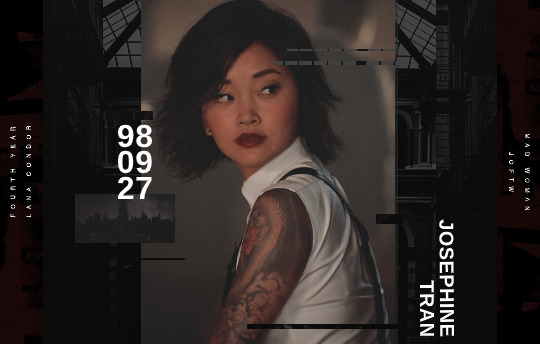
⌠ LANA CONDOR, TWENTY-TWO, SHE/HER, CIS FEMALE ⌡ welcome back to gallagher academy, JOSEPHINE “JO” TRAN! according to their records, they’re a FOURTH year, specializing in RESEARCH & DEVELOPMENT + “MACGUYVER” SURVIVAL SKILLS & NAVIGATION; and they DID go to a spy prep high school. when i see them walking around in the halls, i usually see a flash of (black hair flicking off her shoulders, a sardonic smile, and a slightly clenched jaw). when it’s the (virgo)’s birthday on 9/02/1998, they always request their BEEF PHO from the school’s chefs. looks like they’re well on their way to graduation.
NAME: Josephine Pearl Tran
KNOWN AS: Jo
BIRTHDATE: September 2, 1998
ASTROLOGY: Virgo sun / Capricorn moon / Scorpio rising
HOMETOWN: New York, NY
RESIDENCE: Roseville, VA ( Gallagher Academy )
GENDER: Cis female ( she/her )
SEXUAL ORIENTATION: Refuses to label, but she prefers women
HEIGHT: 5'3"
HAIR COLOR: Black
EYE COLOR: Dark brown
TATTOOS: Rose on her inner arm
KNOWN LANGUAGES: English, German, French, Spanish, Italian, Portuguese, Romanian, Vietnamese & learning Tagalog
IMMEDIATE FAMILY:
Steven Tran: Father, former spy, current night security guard
Kelly Do ( formally Tran ) : Mother, dental hygienist, estranged
Victor Tran: Older brother, Blackthorne alum, estranged
BACKGROUND.
Jo had grown up with a seemingly normal childhood, very much middle class. Her father -- her hero -- was a spy, while her mother was merely a dentist hygienist. Her older brother Victor was the first of the two siblings to develop an interest in the espionage career path. He was the one who found the best spy prep school to attend – and two years later, it only made sense for Jo to be in the same school as her brother.
Jo had never been incredibly girly, spending most of her childhood tagging behind her brother’s friends and picking fights with them. When alone, she spent her time building things, using old tech and parts of anything she could get her hands on to make something completely new. At eleven years old, she had single-handedly made a go-kart for one of her brother's friends, earning him a win in a drag race. Her father had always told her how easy she could make a career out of it one day, but Jo had only seen it as a hobby, something she does for fun.
Everything changed in middle school when Jo met Rose Park, who would become her best friend. Rose was from a legacy spy family, and she was everything Jo wasn’t: girly, cool, confident, gorgeous. The change in Jo was slow: ditching her brother ( who was now too old and cool to hang out with her anyway ) , actually caring about the clothes she wore, and developing an interest in boys and popularity -- if only just for Rose. By the time prep school came around, the go-kart building, tomboy was gone altogether, replaced with a “popular” girl who pretended she had the riches her friends did, and was welcomed in only because of her ties to Rose. And despite living a facade, Jo was happy.
It took a few years into their friendship for Jo to realize that she was in love with the other girl, but she'd never get a chance to tell her.
The Tran and Park families grew close with the bond of the girls. So when enemies of the Park began threatening the lives of their daughters, Jo's father offered to help in any way he could. He became one of the spies assigned as Rose's bodyguard. The threat began the beginning of Jo's senior year ; a few weeks into it, she had come down with a serious case of pneumonia. Her father had been on Rose duty that night had to leave his station a few minutes early to take Jo to the hospital. He had informed the next guard he had to leave a little sooner than usual -- mere minutes -- but when the next guard arrived at Rose's room, it had already been too late.
Rose's death changed Jo's entire world, starting with her family. Jo's father had not only lost his job, but became an enemy of the Park family, blacklisting from the rest of the spy world. As a result of this, Jo’s mother left her husband, and Jo's brother Victor made less and less contact with their father, until he stopped calling all together. Jo chose to stick by her father’s side throughout all of this, but carried the blame for Rose's death heavily on her shoulder for several years. It didn't help that all of her old friends also blamed Jo for Rose's death, and she was quickly outcast among them. Senior year could not have ended fast enough.
After graduating high school, Jo took a year off to get a job and help her father out financially. She had been accepted to Gallagher Academy not long after Rose's death, but Jo couldn't imagine leaving her father's side during such a hard time, nor did she feel like she deserved to go to such a prestigious school. Her dad had convinced her to defer her acceptance for a year. She didn't actually expect things to get better enough for her father to leave him after a year, but he had gotten a job as a security guard in a residential building and refused to let her stay home any longer. So she looked at Gallagher Academy as a fresh start for her and her father, building herself a career that would make them both proud.
GALLAGHER ACADEMY.
Despite the fresh start Gallagher provided, going back to school hadn't been a complete walk in the park for Jo, mostly because many ghosts from her past were also at the school. It certainly didn't help that Rose's older sister, Jude Park, enrolled the same year as her, and made it her mission to make Jo miserable. But after her senior year of high school, nothing would break her spirit or her pride. Jo was able to make friends in her classes -- even ones who she'd eventually call her best friends, a title she never thought she'd give to someone else -- and despite the initial struggle her first semester, she worked twice as hard to ace her classes. Jo made a new reputation for herself at Gallagher Academy, and while it may not always be the most positive one, it didn't involve her father or a dead girl.
Jo didn't love the addition of male students to Gallagher her third year, believing that they were a distraction and most of them didn't take the school seriously enough. ( Honestly, except for a few exceptions, she still thinks that. ) But with her third year came some exciting moments as well. She had been chosen for her first off-campus mission with three other students -- one old friend, one new friend, one enemy -- that involved a protest led by Georgetown students at what was once Blackthorne Institute. What was supposed to be a one-day event was turned upside down when bombs went off at the site, killing a few people and leaving Jo with a broken arm. The rest of the Georgetown protestors were brought into witness protection and to Gallagher Academy, believing it to be nothing more than a rich kid's school. And Jo, who had been undercover at the time as a fellow Georgetown student, had to continue her spring semester pretending to be one of them.
Though a major headache for her, Jo found herself growing attached to the Georgetown students. The continued mission throughout the semester was not easy, especially when she had been one of two third years to be assigned to secretly bodyguard the witsec students, after the campus was deemed potentially dangerous ( two dead bodies would do that ) . It had been tough once they learned the truth about Gallagher and how Jo had been deceiving them, but most were fairly quick to forgive, given the circumstances. But her defenses weren't lowered until the threat of the Brotherhood had been eliminated and the witsec students were able to go back home for good. Somehow through all of this, Jo still managed to ace all her classes.
Her third year also brought some resolution for her and the Park family. She was able to slowly rebuild a friendship with an ex-friend of hers, and even Jude Park and her managed to find some common ground, wordlessly calling a truce. The arrival of Rose's ex-boyfriend also brought back a lot of memories of her own feelings for Rose, and after spending years allowing herself nothing more than clandestine hookups with girls and refusing to acknowledge that side of her, she came out to her two best friends. Her sexuality is still something she's trying to navigate, especially how her traditional father who means everything to her would react to it, but with Jo's fourth year ahead of her, she has more important things to worry about.
PERSONALITY.
Jo’s incredibly ambitious, always striving for the best and not allowing herself any less. Though her parents had always been strict with grades and fulfilling her potential, her worst critic has always been herself, even at a young age. Jo knows her worth and knows when she's not reaching it, and will do anything to make sure she gets there -- even if it means ruining her sleep schedule or social life in the process. Right now her goal is to graduate from Gallagher and get herself the best possible job she can, so she can support her father and start a new chapter in her life. Though she loves being at Gallagher, Jo's very self-aware that it's only four years of her life, and nothing gold can stay.
She’s a little rough around the edges socially, a thick layer of sarcasm and disinterest surrounding herself that makes it hard to connect with people. This, of course, is intentional, because after the way her friends turned on her in high school, she doesn't have time for fake friends. Jo's a very private person, even with those closest to her.
Despite always putting herself first, she loves helping out when she can with other people's studies or career paths, so long as they show her that they actually care about what they're doing. There's nothing Jo hates more than laziness, and students who aren't at Gallagher for the right reasons.
MORE INFORMATION / HEADCANONS:
Her career ambitions have always been to pretty much become Shuri from Black Panther, though the witsec mission and staying undercover during her second semester of her third year does have her wondering if she should look into field agent careers as well.
Her only relationship was with some boy her junior year of high school. He was the best friend of Rose's boyfriend, seemed nice enough, and it was easy to get swept up in the excitement of her first relationship, though that giddy feeling didn't last. She only stayed together with him so long because of convenience, and he ended up dumping her once Rose died.
She had kissed Rose once, a few days before her death, though the two had never completely acknowledged it. The unknown reasoning behind it still kills Jo to this day.
Jo is a very healthy eater, thanks to it being drilled in her head by her mom as a kid. Her go to treat on cheat days is ice cream, which her favorite flavor is coffee, though she prefers vanilla to chocolate.
Her mother had sent her a card for her first birthday after leaving the family, which Jo had never opened and thrown it right into the trash. She told her father that if she were to write to her again, to not let her know. Jo hasn't heard from her brother Victor since he texted her to offer her good luck on her first day at Gallagher. It's not hearing from him that stings the most, especially now that he's a Blackthorne graduate and could be dead for all she knows.
Though her father’s always been her favorite, they hadn’t been very close until all they had was each other. He’s the one person Jo would put above herself, which says a lot.
She's left handed.
TL;DR: Jo is a techie wiz who takes everything seriously and struggles with being the best because of a broken family and ex-spy father who she wants to restore her family name for, after he indirectly killed her best friend that Jo was in love with back in high school. She’s pretty grumpy but means well!
CURRENT & WANTED CONNECTIONS HERE
13 notes
·
View notes
Photo
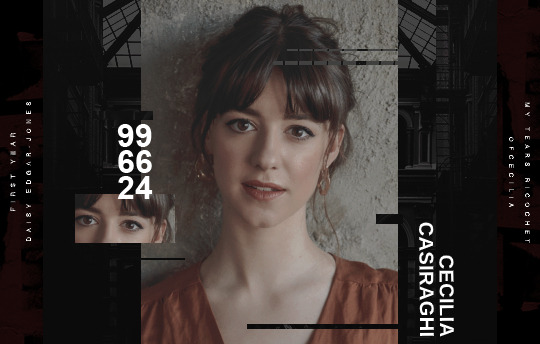
⌠ DAISY EDGAR-JONES, 20, CIS FEMALE, SHE/HER ⌡ welcome back to gallagher academy, CECILIA CASIRAGHI! according to their records, they’re a FIRST year, specializing in SEDUCTION & FLIRTATION + LINGUISTICS, CULTURE & ASSIMILATION; and they DID NOT go to a spy prep high school. when i see them walking around in the halls, i usually see a flash of (pink satin sheets, the warm glow of a sunrise, the first pour of a bottle of red wine, unflinching doe eyes). when it’s the (capricorn)’s birthday on 1/13/01, they always request CANNOLIS from the school’s chefs. looks like they’re well on their way to graduation. ⌿ deanna, 25, she/her, est ⍀
NAME: Cecilia Anastasia Casiraghi
KNOWN AS: Cecilia, Celia, Cissy
BIRTHDATE: January 13, 2001
ASTROLOGY: Capricorn sun / Virgo moon / Pisces rising
HOMETOWN: Tuscania, Italy
RESIDENCE: London, England
GENDER: Cis female ( she/her )
SEXUAL ORIENTATION: Bisexual
HEIGHT: 5'7"
HAIR COLOR: Dark Brown
EYE COLOR: Dark Brown
TATTOOS: None
KNOWN LANGUAGES: English, Italian, Russian, French, Spanish
IMMEDIATE FAMILY:
Allegra Casiraghi: Mother, currently in jail
Federico Casiraghi: Father, currently in jail
Salvatore Casiraghi: Eldest brother
Niccolo Casiraghi: Second eldest brother
Anya Casiraghi: Elder sister
ABOUT:
Born Cecilia Anastasia Casiraghi, the baby of the Casiraghi family. You know them and you hate them, real asshat parents who value money and prestige over actually being nice to their kids. It's hard not to grow up despising your parents in that setting, though Cecilia would be lying if she said she didn't enjoy the being rich part of it all. Still, it wasn't worth the pressure and scrutiny she received from her parents.
She grew up in a giant castle in Italy where she liked to pretend she was a princess trapped in the highest tower waiting to be rescued. Cecilia watched her older siblings seem so put together and polished, exactly what their parents wanted them to be, and couldn't help but feel isolated from the rest of her family ( though her older brother Nico was her fave ) . The older she got, the longer she waited for things to snap into place, only to be met with disappointment.
She got more rebellious as she got older, which didn't bode well in the Casiraghi household. Her father tried to break her spirit, which in turn only made her angier, causing her to run away when she was sixteen. She didn't leave so much of a note to her family, but she knew if they wanted to find her, they'd have the resources to do so. They didn't.
She struggled once moving to London, because a rich girl isn't exactly great at not being rich, but she had been saving up stolen money from her parents for a few months before leaving, so she had enough to find herself a place to live while she worked odd jobs here and there. She wanted to focus on art, her passion, the one thing her family had always told her she was good at ( though they also said it wasn't practical ) . But, surprise surprise, art is NOT practical, and nobody wanted to buy paintings from an actual nobody.
The story goes that she struggled for about a year before making connections with a local art gallery to hold a week-long exhibit of her work. There she made a few sales on her art, though the most noteworthy one had been selling a self-portrait to a wealthy older man who took a liking to Cecilia and decided to fund her art career, and her lifestyle. From then on she lived the glamorous city life she had been destined for, only realizing recently that art and partying can only get her so far. She had begun to miss the world she had been born into, even if she didn't miss the family that came with it. So Celia reached out to a few old contacts, and was able to secure herself a spot at Gallagher Academy in the fall. Despite the drama of her parents being arrested for tax evasion and fraud, she found that the name Casiraghi still holds some weight in the spy world.
WARNING: TOP SECRET INFORMATION
The reality of the situation is that even with the money Celia had stolen from her parents, her life was nowhere close to the one she used to live, and being poor kind of got old. Plus she still had this BURNING anger towards her parents, partly for letting her leave so easily.
She had been living on her own for almost a year, and what little money she had left was slowly depleting. She had been one level above rock bottom when a faculty member of Caledonia Institute found her. Though she had no interest in returning to the spy world, they had fed into her ego that her being a part of their team was IMPERATIVE, and in return they would give her back the life she once had, while making her parents suffer. How could she say no to that?
At only seventeen she was one of the youngest to enroll in Caledonia, and she became a professional spy in the process. She'd have to sit through two years of training and schooling before getting an active mission, but training at Caledonia -- while strict -- was unlike the harsh treatments she was used to from training with her family. With a new outlook on the spy world, Cecilia began to enjoy it once more, and it helped that she was good at it.
Mr. Stewart of Caledonia had promised her that her parents would pay for their sins, and in the spring he had upheld his end of the bargain. Her parents were caught and tried for tax evasion and fraud, and she heard through the grapevine that they'll be going to jail for a long time. Though she wasn't sure what this means for her siblings, Celia was just glad karma finally bit them in the ass.
Conveniently after they're arrested, Mr. Stewart gave Cecilia an assignment for the fall : everyone knows about Cole Conner's Gallagher Academy assignment from last fall, and how he's garnered less-than-stellar results. So she’s been enrolled as an incoming first year, returning to the spy world with a story weaved of her glamorous life in London, ready to pay off her debts to Caledonia without hesitation.
PERSONALITY:
Celia is a total chameleon, able to morph her image and personality when needed in social situations. It's how she makes herself easily likable and gets people to let her in easily, though her doe eyes certainly don't hurt. She makes it easy for people to get wrapped up in her storytelling and the lies she spins for the sake of getting on other's good sides. Not only is she good at it, but she gets off on the thrill of it, because it's fun pretending to be someone you're not ! Whatever you want her to be, she can be it.
Underneath the surface, Cecilia is truly a spoiled brat who likes getting her way and winning, and once in a while parts of that haughtiness will break through the cracks of her facade. Caledonia had worked hard to take the rebel out of the girl, but parts of it still appear on occasion, though never against her agency.
Above everything, she's trying not to make waves while in Gallagher, to go by undetected, so the easiest way to describe her would be Nice. ( This might change while I play her so we’ll see welp. )
TL;DR: She's Nico's younger sister ! But ran away from her family when she was sixteen because she hates them, and at her lowest point Caledonia Institute swooped in and saved her ( and also got her parents arrested and made them lose their money whomp whomp ) and now she's a double agent working for them. She’s looking to make friends with everyone who’s anyone at Gallagher. Two-faced bitch but ya gotta love her ? Or don't, you probably shouldn't.
WANTED CONNECTIONS:
She’s going to be meticulously crafting her own inner circle of friends for her own enjoyment at Gallagher, a mix of people from influential families and those who are deemed “popular” or worth having around, please send headshots and a resume if ur interested xoxo
Family friends of the Casiraghi family, who she hasn’t seen in at least three years.
Other students who trained with her siblings in the super super exclusive training program her parents ran.
Those she's crossed paths with living in London for a year: friends, flings, fellow artists, coworkers at her crappy jobs, etc.
Fellow first years she can glom onto for automatic friendships right off the bat, regardless of who they are
Legacy family students she can cozy up to for the sake of her job
Someone who is reluctant to trust her, despite her attempts to befriend them/get on their good side
Someone with a crush on her that can sorta see how malleable her personality and is like? But show me the real you?
A no-strings relationship that’s purely physical
Someone she’s stringing along for the sake of getting close and getting information out of them
An upperclassman mentor figure to show her the ropes of Gallagher and help her acclimate
A ride or die that she feels a kinship with, where they click enough that she can be more like herself ( aka a little bitchy )
Someone with a really optimistic/romantic outlook on life that truly tests Cecilia’s efforts to match their enthusiasm
Fellow artists she can spend her free time painting in the gardens with and help her get back into it
Fellow LCA + S&F majors who she’ll either have in her classes or that can give her some class pointers or offer their old notes to her
Someone she got drunk with and maybe let something slip that she shouldn’t have and now it’s awk
Someone weak-willed that she can easily take advantage of/manipulate into doing things for her
Fellow smokers even though I don’t condone the habit!
I have some things on her pinterest page here for inspo, also this tag
Lit rally anything please hmu !
#gallagher:intro#sorry this is the worlds longest intro#there's a tl;dr at the end that's worth it i promise#leaving this here xx
9 notes
·
View notes
Text
Dreamers (2021)
Working toward a better world, a world of racial justice and an end to interlocking oppressions, requires imagination. On this weekend when we remember the Rev. Dr. Martin Luther King, Jr., let's also consider both the history of civil rights and the unbounded creativity of speculative fiction by writers of color as sources of inspiration.
Expanded and revised for the Washington Ethical Society, presented January 17, 2021.
“We are creating a world we have never seen,” writes Adrienne Maree Brown in Emergent Strategy. On this weekend, as we remember the legacy of the Rev. Dr. Martin Luther King, Jr., support a peaceful transfer of power, and recommit to his legacy and the work of civil rights yet to do, it may seem like a luxury or a distraction to engage with imagination. It is not. Just like we cannot allow oppression to steal our joy, we cannot let it steal our imagination. Neither threats of violence, nor attempts to push us into re-creating a fictional and regressive society of the past, nor manufactured austerity preventing relief from reaching working people, nor white supremacy in any form should be allowed to steal our imagination. Our ability to dream of a better world is a matter of collective survival.
What does it take to dream big? What fuels our ability to imagine a future without limits like racism, classism, and sexism? Entering a dream state where equality is possible takes some practice. Music can get us there. Listening to activists who are moving our society forward can help us get into that frame of mind. Great art can invite us into that kind of transformational trance.
Dreaming is important. Dreaming gives us creativity, energy, and a warm vision around which we can gather a community. Dreaming is not enough. Once we have imagined a better world, we have to (we get to) build it, to keep building it, and to rebuild the parts that got torn down when we weren’t paying attention. The next step is to use those dreams as a doorway to action.
Dr. King’s words and actions demonstrated connections between systemic racial inequality, economic injustice, war, threats to labor rights, and blockades to voting rights. All of those forces are still relevant. He and the other activists of his era left a very rich legacy, for which we are grateful. We are not done.
I’ll be drawing today from Dr. King’s 1963 work, “Letter from a Birmingham Jail.” (Also available as an audio file from the King Institute.) I think the critiques he offered in that letter are still valid, especially for us in this community that strives to be anti-racist and yet must acknowledge that we are impacted by the norms of what King calls, “the white moderate.” His letter was a response to Christian and Jewish clergy, who had written an open letter criticizing nonviolent direct action. Though Ethical Culture uses different language and methods than our explicitly theist neighbors, I think it is incumbent upon us to hold on to the accountability that comes with being part of the interfaith community. So I believe this letter is written to us as well. Dr. King wrote:
I must confess that over the last few years I have been gravely disappointed with the white moderate. I have almost reached the regrettable conclusion that the … great stumbling block in the stride toward freedom is not the White Citizens Councillor or the Ku Klux Klanner but the white moderate who is more devoted to order than to justice; who prefers a negative peace which is the absence of tension to a positive peace which is the presence of justice; who constantly says, “I agree with you in the goal you seek, but I can’t agree with your methods of direct action”; who paternalistically feels that he can set the timetable for another man’s freedom; who lives by the myth of time; and who constantly advises [us] to wait until a “more convenient season.” Shallow understanding from people of good will is more frustrating than absolute misunderstanding from people of ill will. Lukewarm acceptance is much more bewildering than outright rejection.
I would like to think that, in this community, we have made some progress since 1963, and that majority-white communities have stopped explicitly trying to slow the pace of civil rights. Indeed, WES can be proud that racial justice has been woven into its goals from the beginning, though we must also be honest that a perfectly anti-racist history is unlikely. At the same time, I see people who claim to be progressive rushing to calls for “civility” or “unity” without accountability. Understanding the direct link between the intended audience of this letter and the people and communities with which we have kinship today is an act of imagination that we must embrace in order to learn from the past and to continue Dr. King’s legacy. “Letter from a Birmingham Jail” can help us understand why we need to dream of something different in the world.
We need dreams and we need plans. We seek inspiration as we continue to work toward bringing a dream of economic and political equality fully into reality.
One place I turn for inspiration is toward socially conscious science fiction. Looking at how the art form has offered critiques of what’s wrong and pathways to what’s right, I see suggestions for how we can nurture the dream of a better world.
Science fiction has even helped me understand spiritually-connected social movements, such as the one depicted in Parable of the Sower and Parable of the Talents by Octavia Butler. The series depicts a self-governing poetic community that tries to live sustainably in an environment affected by catastrophic climate change, and that maintains an improbable vision of exploring the stars. The poetry uses the word God, but not in the way that it is normally used. Recognizing that WES is not a community that makes use of theism, I hope you’ll be able to hear how that metaphor is used in the world of the story. In Parable of the Talents, the main character, Lauren Olamina, writes a poem for her community:
God is change
And hidden within change
Is surprise, delight,
Confusion, pain,
Discovery, loss,
Opportunity and growth.
As always, God exists
To shape
And to be shaped
(Parable of the Talents, p. 92)
In the book, the community that reflects on change in meditation and song is able to use that energy to maintain resilience, even in the face of white supremacist violence and criminalization. Butler imagines an inclusive community led by People of Color who strengthen and encourage one another, inject their strategic planning with an expectation for backlash, and still imagine and make their way toward a better world. Her books provide inspiration to those who know that the negative extremes of the world of the story are possible.
Socially conscious science fiction spins dreams that are extreme, that challenge us in good ways. In science fiction and in practical experience with progressive movements, we learn that dreams need help to become reality.
The alternate universe where justice rolls down like water may seem too fantastic to believe, it may be cobbled together in ways that seem mis-matched to mundane perceptions, and it will certainly take work to achieve. Nevertheless, like Dr. King, I believe “we must use time creatively.”
Dreams Are Extreme
The first thing to note about dreams, whether sleeping or socially conscious, is that they are extreme. Things that would be totally absurd or unthinkable in everyday reality are woven into the fabric of a new vision. The dream might be a positive one, in which we imagine what it would be like to live in a better world. On the other hand, dystopian dreams can also be effective at stirring us to action. In an imagined world, we are met with the possibility that a flaw in our current society might go too far. Absurdity comes uncomfortably close to the truth.
Dr. King spoke about the role of discomfort in “Letter from a Birmingham Jail,” saying that nonviolent direct action is meant to bring that discomfort to bear so that those in power will sit down and negotiate, to recognize people of good conscience. This is different from using violence as coercion, which is destructive to democracy; this is using peaceful means to declare the right of people to have a voice in what concerns them. Dr. King writes:
Nonviolent direct action seeks to create such a crisis and establish such creative tension that a community that has consistently refused to negotiate is forced to confront the issue. It seeks so to dramatize the issue that it can no longer be ignored. I just referred to the creation of tension as a part of the work of the nonviolent resister. This may sound rather shocking. But I must confess that I am not afraid of the word “tension.” I have earnestly worked and preached against violent tension, but there is a type of constructive nonviolent tension that is necessary for growth.
Tension has a place in literature and drama that can also be used for racial justice. I once served as an intern at a regional theater. In one of the plays we presented that year, the plot hinged on something unexplainable and highly improbable, which is one definition for science fiction. It was the 1965 play Day of Absence by African American playwright Douglas Turner Ward. In the story, white citizens of a racist town awaken one day to find that all of the African American residents have mysteriously disappeared. They slowly come to realize that they cannot function without the neighbors they mistreated and took for granted. Rather than try to solve their problems, they spend the rest of the play panicking and blaming each other in comedic ways.
Between the satirical script, the exaggerated makeup, and the abstract set, the show turns reality inside out in an effort to alter the audience’s collective conscience. Day of Absence shines a spotlight on the links between racial oppression and economic oppression, and is an incitement to join a movement for change. Consistent with the Revolutionary Theatre aesthetic, the play is meant to make people uncomfortable. We should be uncomfortable with the real systems of inequality parodied in the play.
It worked. Audiences were uncomfortable. Some patrons were able to take that discomfort and use it to grow. Some patrons were not ready to deal productively with their discomfort. For art or spirituality or dreams or anything else to offer the chance for transformation, creating the opportunity can’t wait until everyone is equally ready to begin the journey.
One goal of satire is to take something that is true and to exaggerate it until the truth cannot be ignored. When that something is oppression, making art that can’t be ignored and suggesting a justice-oriented overhaul to society is going to seem extreme to some people.
Speculative fiction by writers of color, even when not satirical, can also use exaggeration for a positive effect. The 2019 HBO Watchmen series explored this, creating an alternate history that lifted out problems with racism and policing in our own timeline. The Broken Earth trilogy by N.K. Jemisin explores extremes of climate change and identity-based exploitation, and weaves in glimpses of generational trauma between parents and children trying to survive in a society that rejects their wholeness. Extremes in literature can reflect back to us the plain truth.
Similarly, a dream that draws people together for the hope of a society that is very different from what we have, a dream that re-imagines the future of justice and economic opportunity, is going to be considered extreme, which is not a good thing by some standards. Every time there is a popular movie or TV show in the science fiction/fantasy genre that uses multiracial casting, and every time a speculative fiction novel by a writer of color receives sales or awards, there are claims that social justice warriors are running amok, or that trends have gone too far. Allowing for multiracial imagination is considered a violation of balance, a bridge too far. Inclusion is considered extreme, rather than a tool for bringing imagined futures into being.
Dr. King explored this critique of extremism. In “Letter from a Birmingham Jail,” he expresses some initial frustration at being labeled an extremist for his peaceful methods. It seemed that any movement toward change was too radical for the white moderate clergy. But the status quo was not and is not acceptable. Dr. King writes:
So I have not said to my people: "Get rid of your discontent." Rather, I have tried to say that this normal and healthy discontent can be channeled into the creative outlet of nonviolent direct action. And now this approach is being termed extremist. But though I was initially disappointed at being categorized as an extremist, as I continued to think about the matter I gradually gained a measure of satisfaction from the label. Was not Jesus an extremist for love: "Love your enemies, bless them that curse you, do good to them that hate you, and pray for them which despitefully use you, and persecute you." … (Dr. King gives a few more examples before he goes on.) So the question is not whether we will be extremists, but what kind of extremists we will be. Will we be extremists for hate or for love? Will we be extremists for the preservation of injustice or for the extension of justice? … Perhaps the South, the nation and the world are in dire need of creative extremists. (paragraph 24)
I believe the nation and the world are in need of creative extremists. We need dreamers. We need bold playwrights, courageous writers, and artists who cannot be ignored. We need the power to imagine a more just and radically different future.
Dreams Need Help to Become Reality
Another point that connects science fiction with visions of equality is that dreams need help to become reality. We hear often that “the arc of the universe is long, but it bends toward justice,” but the unwritten part of that is that actual people have to do some bending. Dr. King wrote about that, too; though he uses “man” in a way that was common at the time to mean people of all genders, and he invokes his own religious tradition, we can all hear the collective responsibility in this passage. In his “Letter from a Birmingham Jail,” Dr. King wrote:
Human progress never rolls in on wheels of inevitability; it comes through the tireless efforts of men willing to be co workers with God, and without this hard work, time itself becomes an ally of the forces of social stagnation. We must use time creatively, in the knowledge that the time is always ripe to do right. Now is the time to make real the promise of democracy and transform our pending national elegy into a creative psalm of brotherhood. Now is the time to lift our national policy from the quicksand of racial injustice to the solid rock of human dignity. (paragraph 21)
We can and should have hope. We still need to act according to our values. No act of encouragement, no vote cast, no letter written is a wasted effort. We must use time creatively. In the case of arts, literature, and entertainment, we must also use time travel creatively. Progress does not happen by accident.
Nichelle Nichols, who played Lieutenant Uhura in the original Star Trek series, spoke about the creation of her character and why she chose to stay on the show. None of it was an accident. When she first met with Gene Roddenberry, she was in the middle of reading a book on Uhuru, which is Swahili for freedom. Roddenberry became more convinced than ever that he wanted a Black woman on the bridge of the Enterprise. Nichols said:
When the show began and I was cast to develop this character – I was cast as one of the stars of the show – the reality of the matter was the industry was not ready for a woman or a Black and certainly not the combination of the two (and you have to remember this was 1966) in that kind of role, on that equal basis, and certainly not that kind of power role.
Nichols was also an accomplished singer and stage actress. The producers never told her about the volume of fan mail she was receiving. She was considering leaving the show to join a theatrical production headed for Broadway, when she was at an event (probably a fundraiser for the NAACP, but Nichols doesn’t remember clearly) and was asked to meet a fan. The fan turned out to be the Rev. Dr. Martin Luther King, Jr. He told her how much he enjoyed the show, and that it was the only show he and his wife allowed their children to stay up late to watch. She told him that she was planning to resign. “You cannot!” he said. Nichols goes on:
Dr. King said to me, ‘Don’t you understand that you have the first non-stereotypical role in television in a major TV series of importance, and you establish us as we are supposed to be: as equals, whether it’s ethnic, racial, or gender.’ I was breathless. ‘Thank you, and Yes, I will stay.’
Nichols’ decision to stay had a ripple effect. Whoopi Goldberg said that the first time she saw Lieutenant Uhura on television was a major turning point for her as a child. Mae Jemison, the first African American astronaut in space, spoke about Uhura as an inspiration. Stacey Abrams is a fan.
The inner workings of a TV show with cheesy special effects, beloved as that show may be, might seem inconsequential to the future of human rights. I maintain that anything that expands our ability to dream of a better world is necessary. Stories that give us building blocks for change make a difference. And representation matters. People are hungry for diverse, respectful, innovative stories. Representation increases the chances that someone from a marginalized group can get the resources to tell their own stories rather than relying on the dominant group to borrow them. In this age of communication, it is possible to engage people from all over the planet in a conversation about our shared future. The trick is that we have to work to make sure all of the voices are included. The dream of a better world needs people who can make it a reality.
Imagination is key, and it is a starting point. In Emergent Strategy, Adrienne Maree Brown writes:
Science fiction is simply a way to practice the future together. I suspect that is what many of you are up to, practicing futures together, practicing justice together, living into new stories. It is our right and responsibility to create a new world. What we pay attention to grows, so I’m thinking about how we grow what we are all imagining and creating into something large enough and solid enough that it becomes a tipping point.
Earlier, you heard another quote from the book, in which Brown names the Beloved Community that we can use imagination to grow ourselves into. She names “a future without police and prisons ... a future without rape … harassment … constant fear, and childhood sexual assault. A future without war, hunger, violence. With abundance. Where gender is a joyful spectrum.”
Brown frames this imagined future world, this Beloved Community, as a project of both imagination and community organizing. A better world is possible.
Conclusion
The arts, in particular science fiction, can ignite a kind of a dream state. By using time and time-travel creatively, we can envision a world of justice, equality, and compassion. We have yet more ways to craft stories and plans that respect the inherent worth and dignity of every person. The dream of economic equality, the dream of equal voting rights, the dream of equal protection under the law all need foundations built under them.
If we wish to count ourselves among the dreamers, let us take action. We can continue to build coalitions with partner organizations of other faiths and cultures. We can send representatives to workshops and meetings, and listen carefully to their findings when they return. We can read about dismantling oppression and share what we find with each other.
This community is a place where we can dream freely. Let us use time effectively. Let us enter into the powers of myth, creativity, and art to imagine a better future. And then let us work and plan to make that better future come to pass. May our dreams refresh us and energize us for the tasks ahead.
May it be so.
2 notes
·
View notes